

Georgia Tourbook Guide
Including atlanta, savannah and the golden isles.
Explore an area steeped in history with the digital AAA TourBook guide. From the cobblestone streets of historic Savannah, Georgia, to Atlanta’s Sweet Auburn Historic District and the civil rights movement, Georgia offers something for everyone. Plan your next trip with the help of AAA’s digital TourBook travel guide, available for mobile, tablet or desktop.
With this trip guide, you’ll receive advice from AAA travel experts about the best things to see and do, where to stay and how to plan the trip of a lifetime. You’ll learn insider travel tips and answers to many top questions asked by travelers.
Here’s a sampling of things you’ll find in Georgia guide.
- What to see in Atlanta, Georgia
- How to watch the Atlanta Braves
- Why are they called the Golden Isles?
- Where’s the Georgia Aquarium?
- Where did Martin Luther King Jr. grow up?
- What’s Savannah, Georgia, known for
- Why Savannah was not burned during the Civil War
What are some of the must-dos covered in this guide?
Each guide contains a variety of things to do. Recommendations range from recreational activities in national parklands to museums and theme parks.
We cover top outdoor activities, such as Chattahoochee River rafting or Cumberland Island National Seashore camping. Learn about the civil rights movement at the Martin Luther King Jr. National Historic Site and landmark museums such as the National Center for Civil and Human Rights and APEX Museum. Take the whole family to Six Flags Over Georgia, Atlanta’s largest theme park. Go on a ghost tour in the Savannah Historic District, or take a walk on the wild side at the Okefenokee National Wildlife Refuge.
You’ll find all these attractions and more in our digital destination guide.
Will this guide help me plan a road trip?
Yes! This guide includes inspiration for scenic drives and road trips in Georgia. You can also use the high-quality maps to get started planning your own route.
Is national park information included?
Yes. The Georgia TourBook includes detailed information and travel tips for National Historical Parks such as Martin Luther King, Jr. and Ocmulgee Mounds as well as the Jimmy Carter National Historic Site. Military history is represented at Andersonville National Historic Site, Chickamauga & Chattanooga National Military Park National Monument, Fort Frederica National Monument, Fort Pulaski National Monument and Kennesaw Mountain National Battlefield Park.
You’ll also find travel information about top public areas such as Augusta Canal National Heritage Area, Chattahoochee River National Recreation Area and Cumberland Island National Seashore.
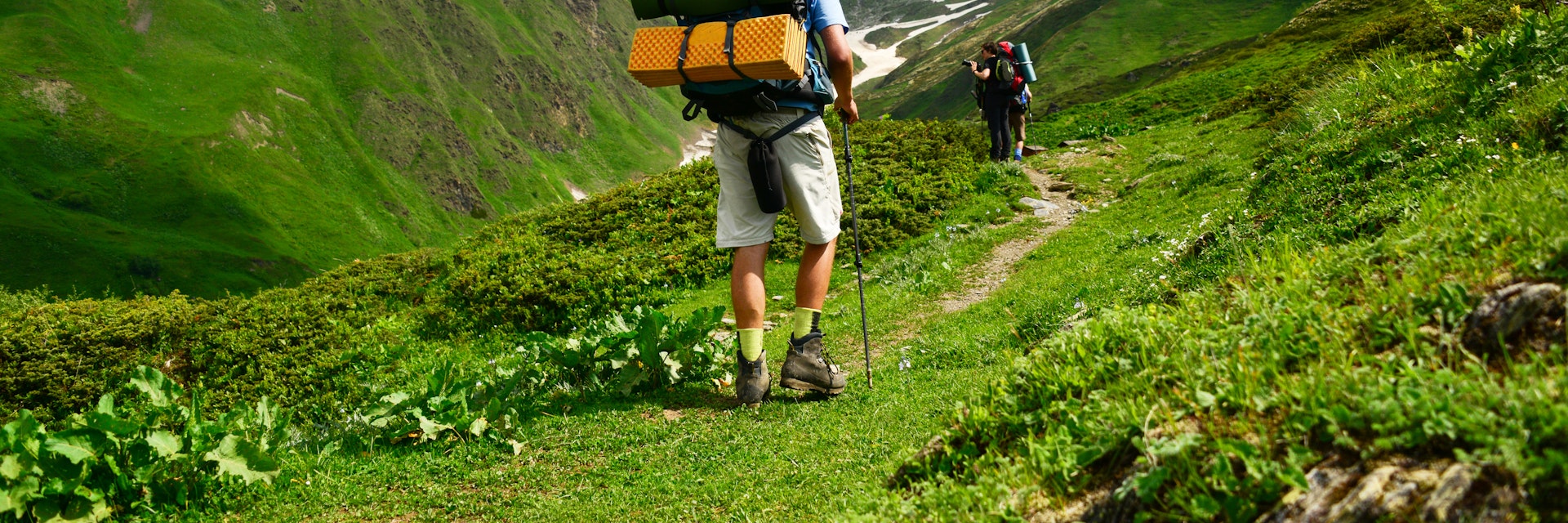
©Maya Karkalicheva/Getty Images
Having gone from backpacker secret to mainstream darling in just a decade, Georgia today is by far the most visited country in the South Caucasus, and it’s easy to see why: its rich culture and astonishingly diverse landscapes make it an ideal destination for anyone loving history and nature on the grandest of scales.
Attractions
Must-see attractions.
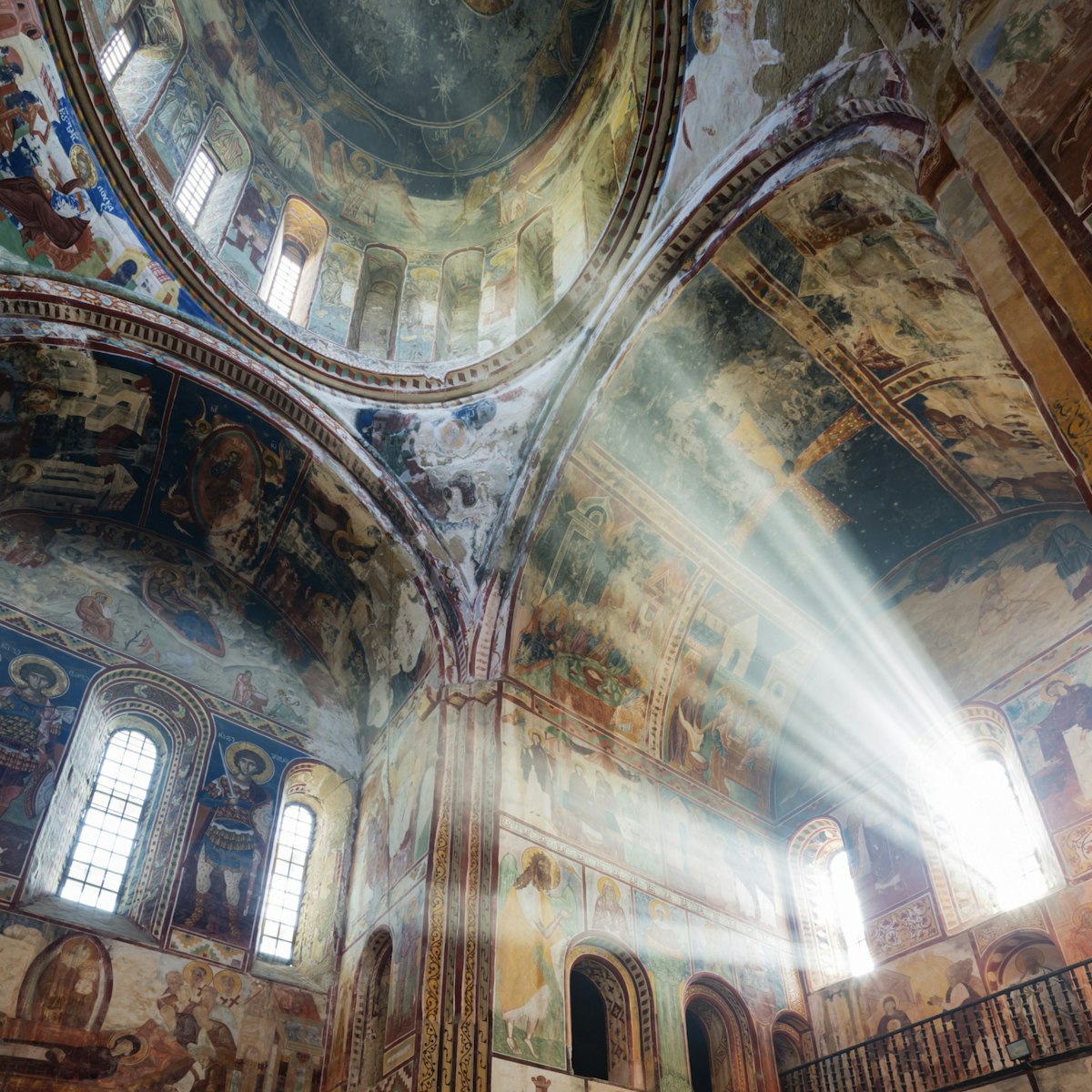
Gelati Monastery
Western Georgia
This Unesco World Heritage–listed monastery complex, on a wooded hillside 8km northeast of Kutaisi, is an outstanding example of Golden Age architecture…
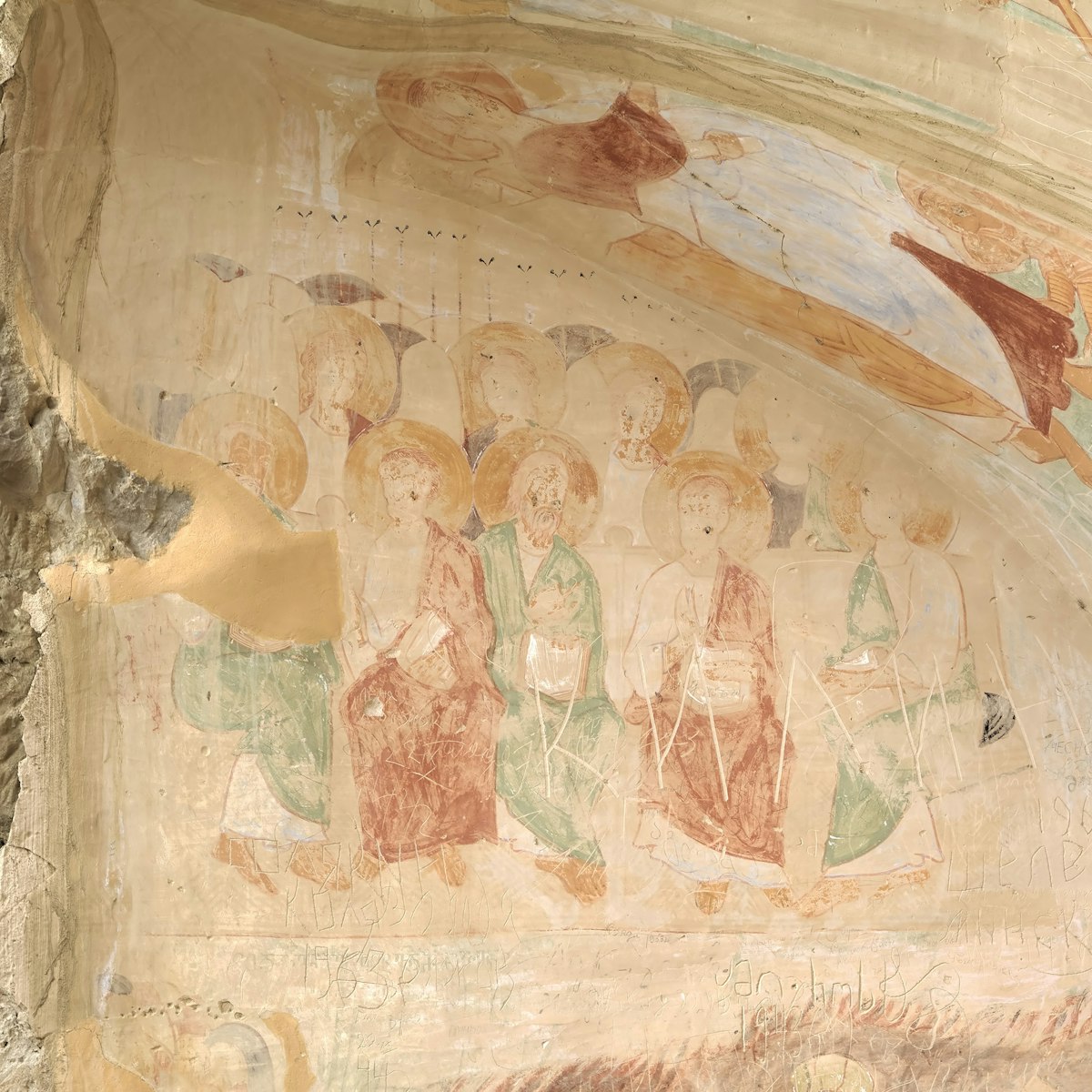
Udabno Monastery
Davit Gareja
Less of a monastery than a series of cave-hewn chapels, Udabno runs along a steep escarpment looking down to grassy plains in Azerbaijan. While many caves…
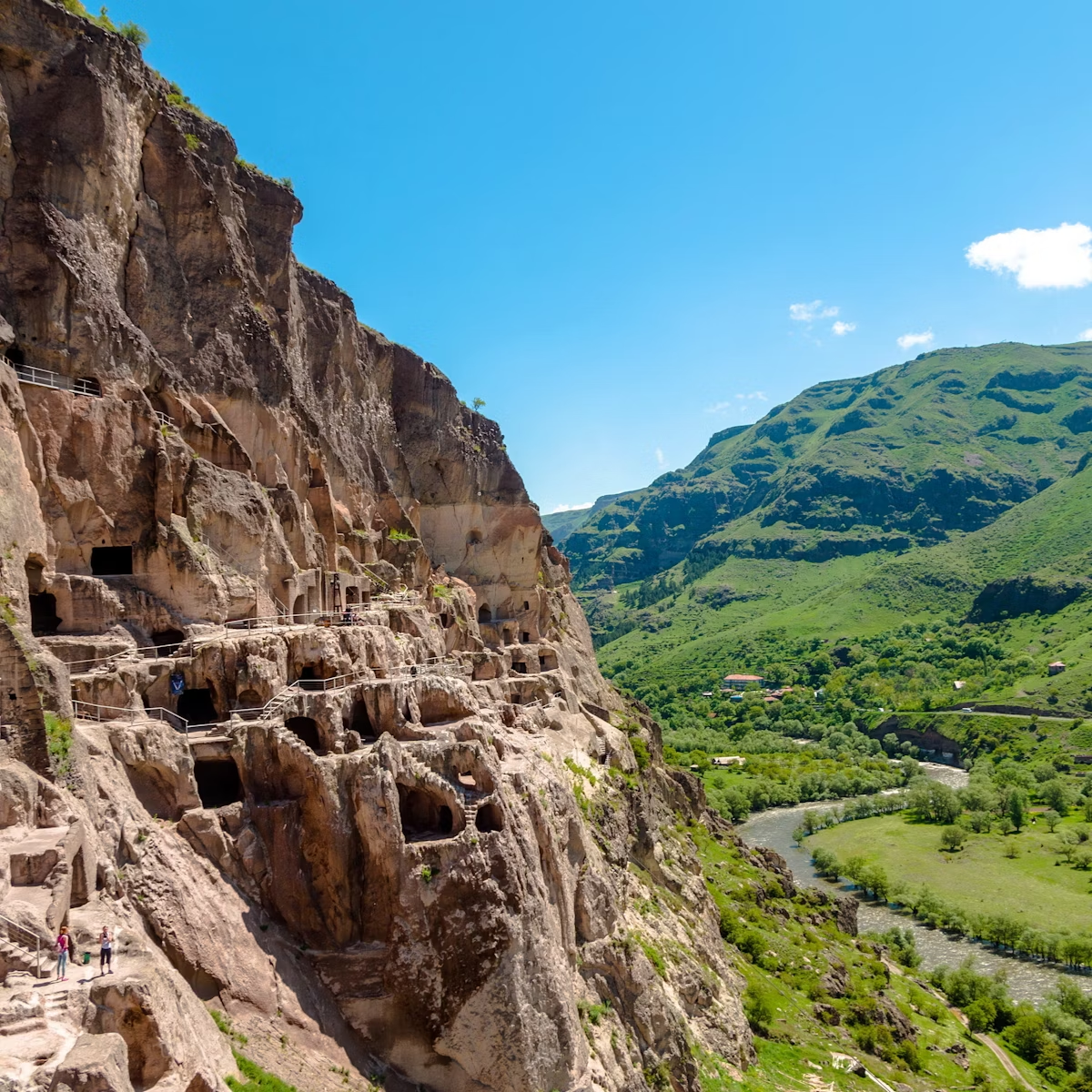
The remarkable cave city of Vardzia is both a cultural symbol and a spectacular natural phenomenon with a special place in Georgian hearts. King Giorgi…
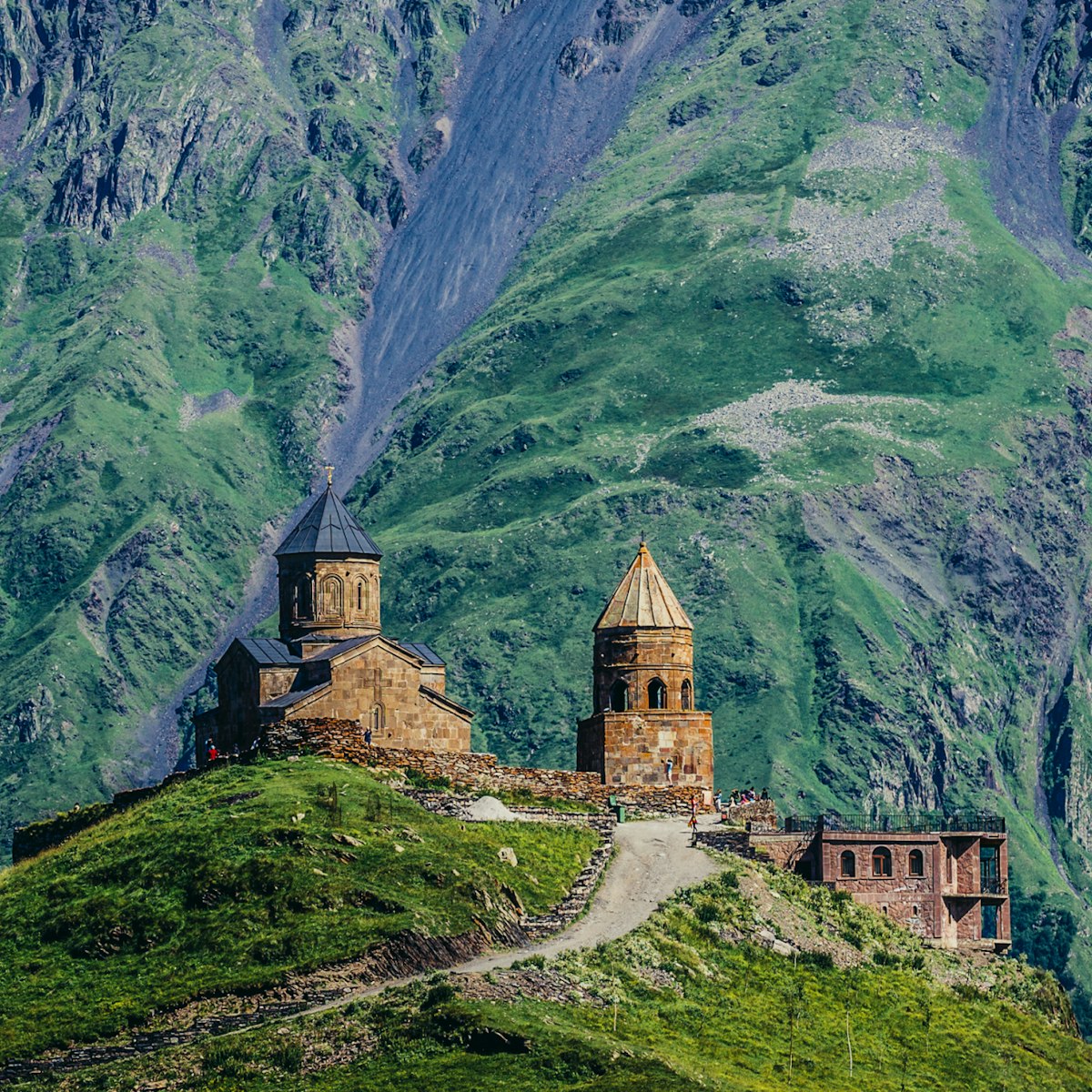
Tsminda Sameba Church
Stepantsminda
This 14th-century church 2200m above Stepantsminda has become almost a symbol of Georgia for its incomparably photogenic hilltop setting with mighty Mt…
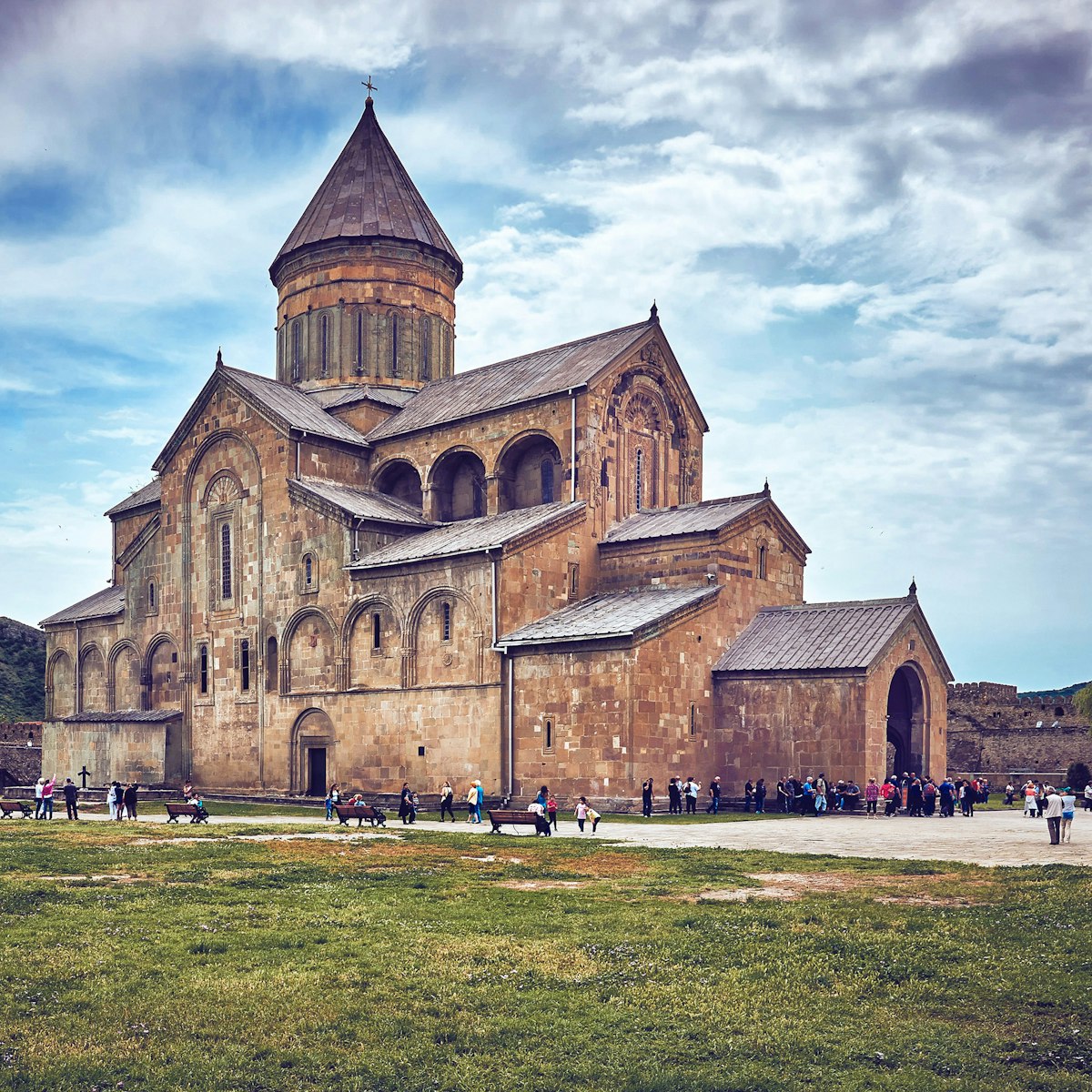
Svetitskhoveli Cathedral
Southern Georgia
This extraordinary (and for its time, enormous) building dates from the 11th century, early in the golden age of Georgian church architecture. It has an…

Shatili Old Town
Great Caucasus
This magnificent agglomeration of koshkebi (defensive watchtowers) and atmospheric slate houses packed tightly together on a steep hillside to create one…
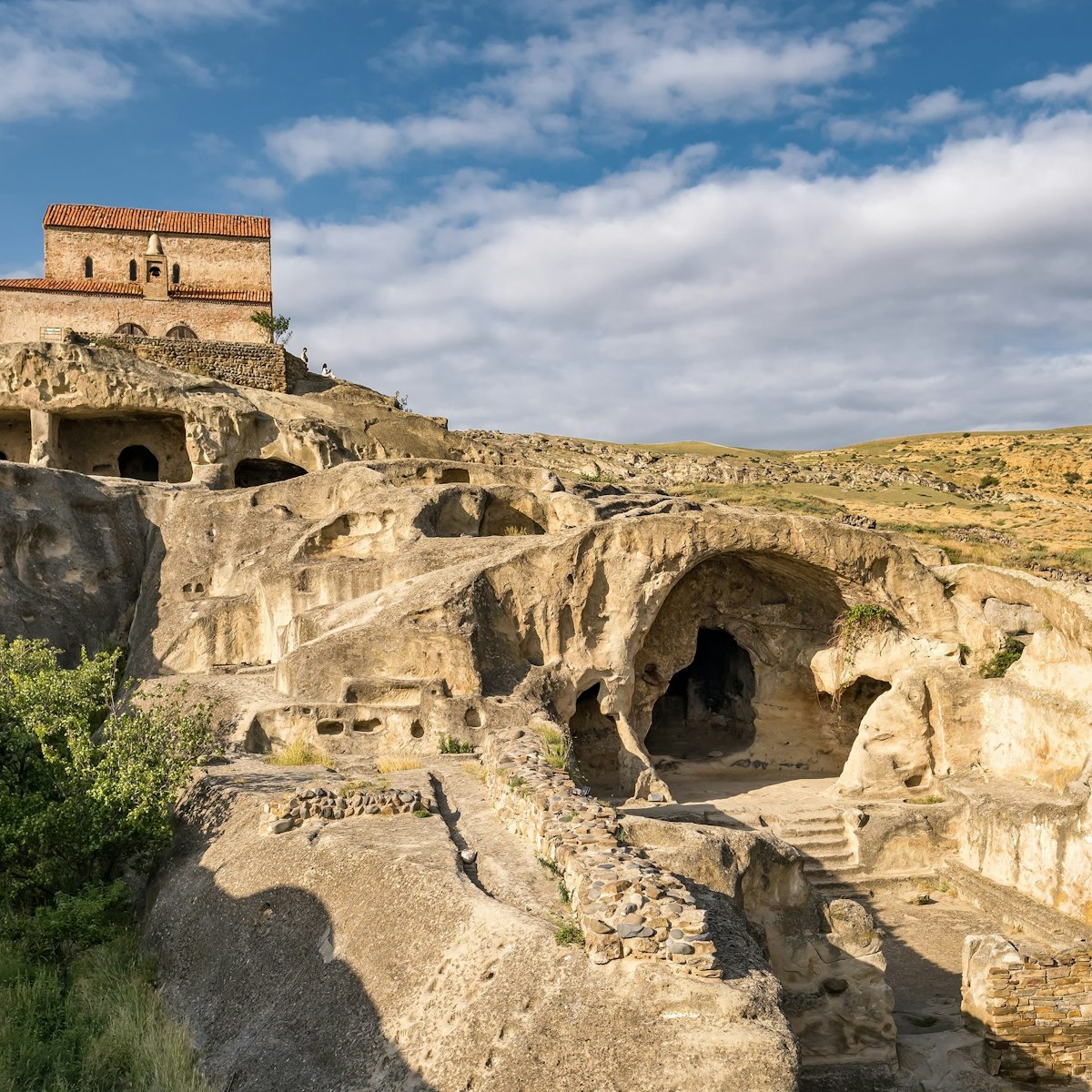
Uplistsikhe
This once enormous cave city sits 10km east of Gori above the north side of the Mtkvari River. Between the 6th century BC and 1st century AD, Uplistsikhe…
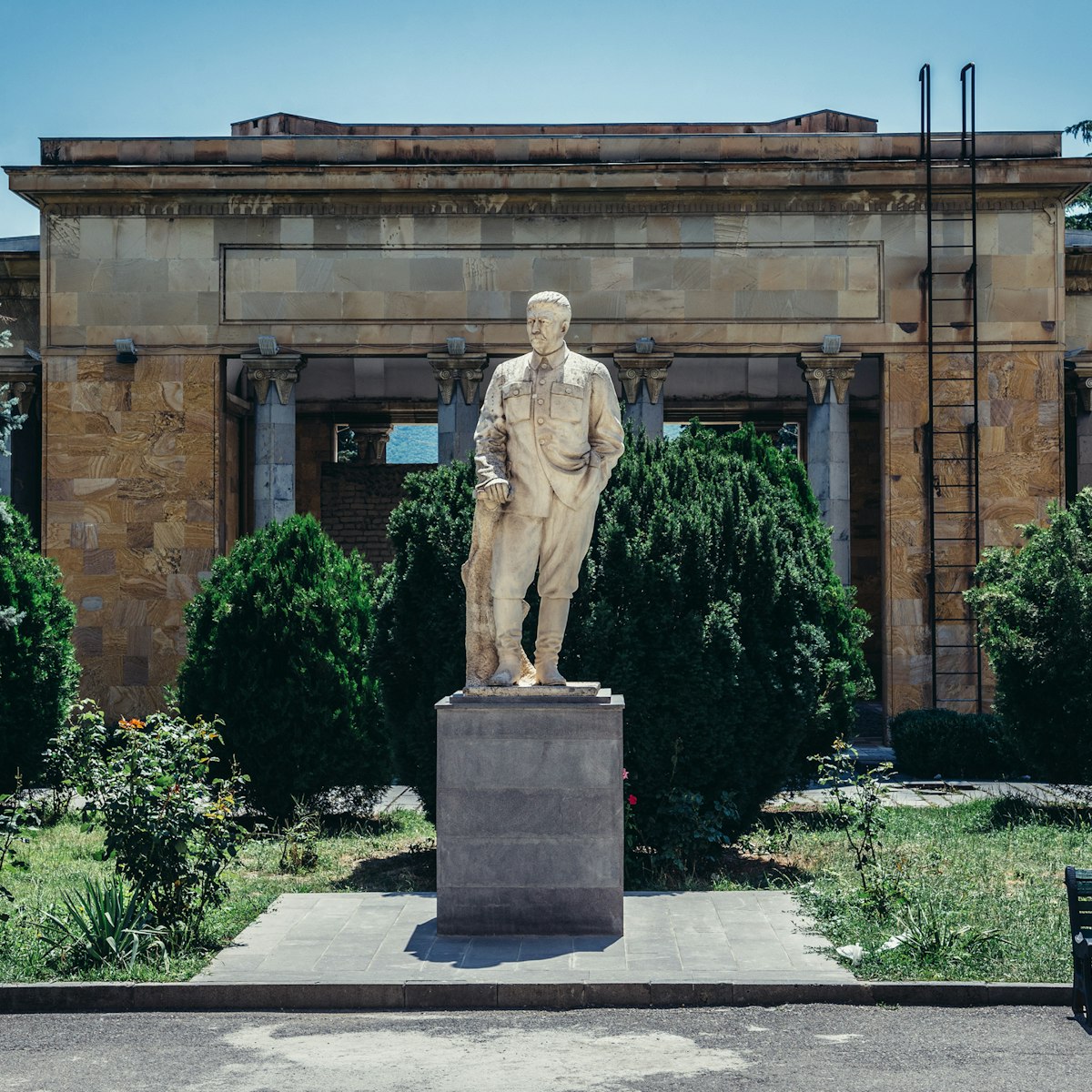
Stalin Museum
This impressively designed museum makes no serious attempt to present a balanced account of Stalin's career or deeds. It remains, much as when it opened…
Latest stories from Georgia
Filter by interest:
- All Interests
- Adventure Travel
- Art & Culture
- Beaches, Coasts & Islands
- Food & Drink
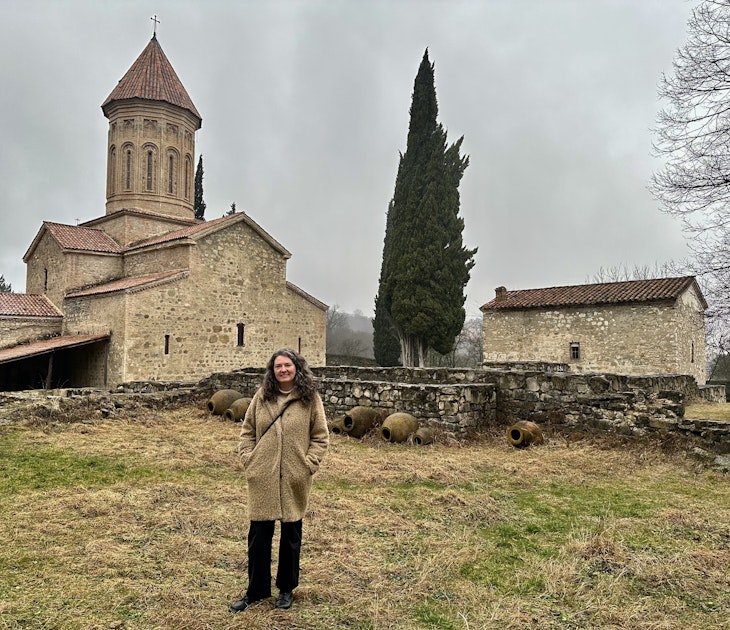
Solo Travel
Apr 23, 2024 • 5 min read
Lonely Planet editor, Alex Butler, recently traveled to Georgia. Here, she shares some tips and insights for anyone planning a similar trip.
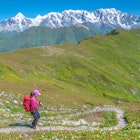
Feb 17, 2022 • 9 min read

Apr 27, 2021 • 6 min read
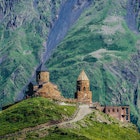
Feb 5, 2021 • 2 min read
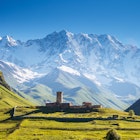
Jul 22, 2020 • 3 min read

Mar 30, 2020 • 5 min read
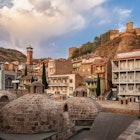
Feb 3, 2020 • 5 min read

Jan 20, 2020 • 4 min read
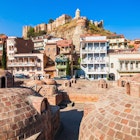
Dec 24, 2019 • 7 min read

Nov 27, 2019 • 4 min read
in partnership with getyourguide
Book popular activities in Georgia
Purchase our award-winning guidebooks.
Get to the heart of Georgia with one of our in-depth, award-winning guidebooks, covering maps, itineraries, and expert guidance.
Georgia and beyond
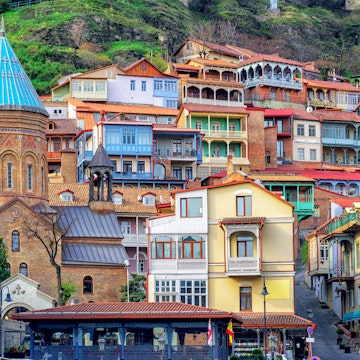
Georgia travel guide, 7th edition. Expert advice and tourist information, from Tbilisi hotels and restaurants to the Transcaucasian Trail and other treks. Covers hotels, homestays, wine, Caucasus history and politics, ecotourism, churches, architecture, Mtskheta, Svaneti, Mestia, Batumi, Borjomi-Kharagauli, Vardzia, Karkheti, Gelati/Bagrati.
Related products
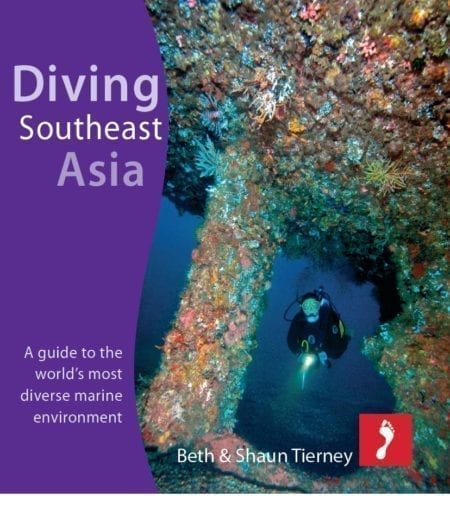
Diving South East Asia Footprint Activity & Lifestyle Guide

Cycling in Cornwall and the Isles of Scilly

Sao Tome & Principe
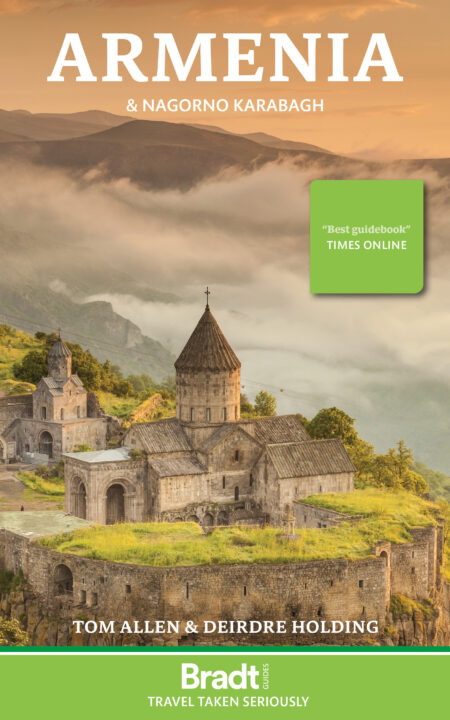
About this book
This new seventh edition of Bradt’s Georgia remains the only dedicated guide to this fascinating, budget-friendly Caucasian country, where tourism continues to increase and domestic travel is increasingly straightforward. Thoroughly updated throughout to reflect recent developments, this guidebook includes revised and new listings for hotels, homestays, restaurants, what to see and do, and how to get around by public transport. At the intersection of Europe and Asia, nestled between Russia, Armenia, Azerbaijan and Turkey, Georgia is the hub of the Caucasus – a country known for its mountains and Black Sea coast, and its wonderful food, wine and all-round hospitality. With Bradt’s Georgia, you can experience the new alongside the old in a country where most cultural and historical sights are free of charge or very cheap. The capital, Tbilisi, boasts a charming, cobbled old town, the centuries-old tiled baths of Orbeliani and numerous cultural highlights, but has also seen major developments recently, including conspicuous new projects such as the Peace Bridge. Already famous for the cave monastery of Vardzia and the ancient wine-growing region of Kakheti, Georgia’s more remote areas are becoming more accessible. Networks of rural guesthouses and hiking trails (including the increasingly popular Transcaucasian Trail, a volunteer-led project to create two long-distance hiking routes) are being developed alongside a push towards more sustainable and responsible tourism. On the Black Sea, the city of Batumi has developed into a glitzy playground for regional tourism. Appropriately, given that the country is considered to be the birthplace of wine, the Georgian wine industry features prominently, with particular emphasis on the UNESCO-listed natural qvevri wines (made in clay amphorae set in the ground). Also covered are: skiing at Gudauri, Bakuriani and Mestia; cycling; the World Heritage sites of Mtskheta, Svaneti and Gelati/Bagrati; Georgian fusion cuisine (now celebrated in Tblisi’s stylish new restuarants); 5th-century churches and other Christian architecture; cave cities; and Georgian polyphonic singing. Bradt’s unique guide to Georgia is the ideal companion for travellers, from serious hikers to wine buffs, high-end culture lovers to winter-sports enthusiasts, and city-break aficionados to backpackers of all ages.
Before ordering ebooks from us, please check out our ebook information .
About the Author
Tim Burford (unraveltravel.org) studied languages at Oxford University. In 1991, after five years as a publisher, he began writing guidebooks for Bradt, firstly on hiking in east-central Europe and then on backpacking and ecotourism in Latin America. He has now written ten guides for Bradt, stretching from Uruguay to Uzbekistan, and including five editions of the guide to Georgia. He also leads hiking trips in Europe’s mountains. Burford first went to Georgia in the late 1990s and found it possessed the authentic charm that Romania had in 1991 but soon began to lose. Happily, Georgia’s authenticity has been preserved in many ways by a passionate national commitment to its food, drink and customs. These are exactly the things that Burford enjoys discovering when he travels, as much at home as abroad – any excuse to get on a bike and explore.
Additional Information
Chapter 1 Background Information Geography, Climate, Natural history and conservation, History, Economy, People, Language, Religion, Culture Chapter 2 Practical Information When to visit, Highlights, Suggested itineraries, Tourist information, Tour operators and travel agents, Red tape, Getting there and away, Health, Safety, Women in Georgia, LGBT travellers, What to take, Money, Budgeting, Getting around, Accommodation, Eating and drinking, Shopping, Media and communications, Other practicalities, Business, Cultural etiquette, Travelling positively Chapter 3 Tbilisi History, Getting there and away, Getting around, Tourist information, Where to stay, Where to eat and drink, Entertainment and nightlife, Activities, Other practicalities, Shopping, A day’s tour of Tbilisi, What to see and do Chapter 4 Shida (Inner) Kartli Mtskheta, Around Mtskheta, The roads west from Mtskheta, Gori, Around Gori, West of Gori Chapter 5 The Georgian Military Highway North of Mtskheta, Stepantsminda (Kazbegi), North of Stepantsminda, Khevsureti Chapter 6 Samtskhe-Javakheti Nedsvi, Borjomi, Borjomi-Kharagauli National Park, Bakuriani, Southwest from Borjomi, Vardzia, Ninotsminda and beyond Chapter 7 Imereti, Racha, Mingrelia and Guria Imereti, Kutaisi, Around Kutaisi, Racha, Mingrelia, Poti, Guria, Abkhazia Chapter 8 Svaneti Culture and history, Getting there and away, Mestia, Ushguli Chapter 9 Adjara Kobuleti, Batumi, To Gonio and the Turkish border, Mountainous Adjara Chapter 10 Kakheti Getting there and away, Eastwards from Tbilisi, Ninotsminda and Tsinandali, Telavi, West of Telavi, Tusheti, East of Telavi: from Gremi to Kvareli and Lagodekhi, Sighnaghi and beyond, Davit-Gareja Chapter 11 Kvemo (Lower) Kartli Marneuli and Bolnisi, Betania and Manglisi
Nomadic Matt's Travel Site
Travel Better, Cheaper, Longer
Georgia Travel Guide
Last Updated: August 31, 2023
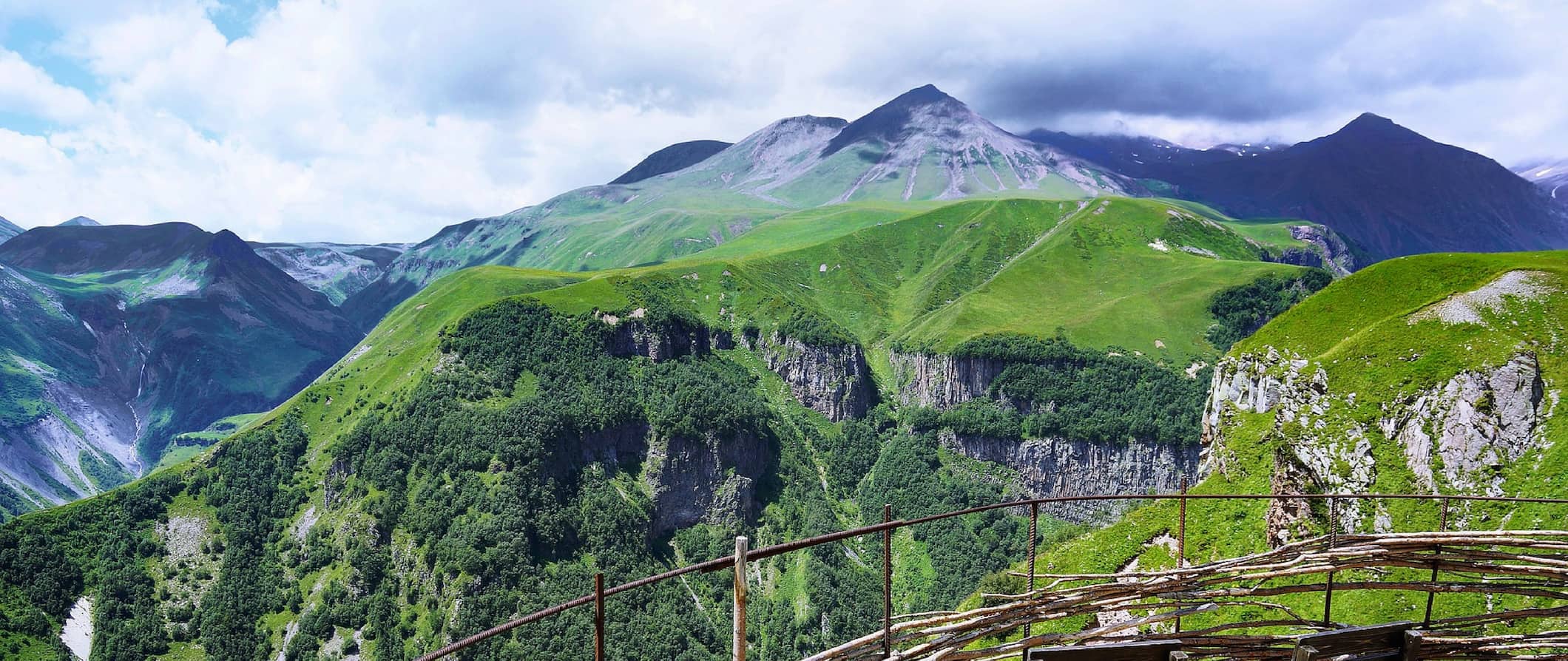
Backpacking Georgia was everything I thought it would be.
For years, I’d heard from my more well-traveled friends that Georgia was the place to be; it’s cheap, has delicious food and wine, incredible hikes and mountain scenery, and is devoid of huge numbers of tourists.
When I finally traveled around Georgia, I found they were right. I loved Georgia. It was better than I thought it could possibly be.
The country is in the Caucasus region and has a rich history, owing to its location at the intersection of Europe and Asia. It’s long been a cultural crossroads. Artifacts, including evidence of wine production, date to 6000 BCE, earning Georgia the nickname the “Cradle of Wine.”
From ancient monasteries to vineyards to tiny mountain towns to the Black Sea beaches, Georgia has it all — without the prices or crowds of Europe . The capital, Tbilisi, known for its diverse architecture and maze-like cobblestone streets, has a hip art and robust foodie scene. ( I loved Tbilisi so much I extended my time there .)
This travel guide to the country of Georgia can help you plan your trip, save money, and make the most of your visit!
Table of Contents
- Things to See and Do
- Typical Costs
- Suggested Budget
- Money-Saving Tips
- Where to Stay
- How to Get Around
- How to Stay Safe
- Best Places to Book Your Trip
- Related Blogs on Georgia
Top 5 Things to See and Do in Georgia
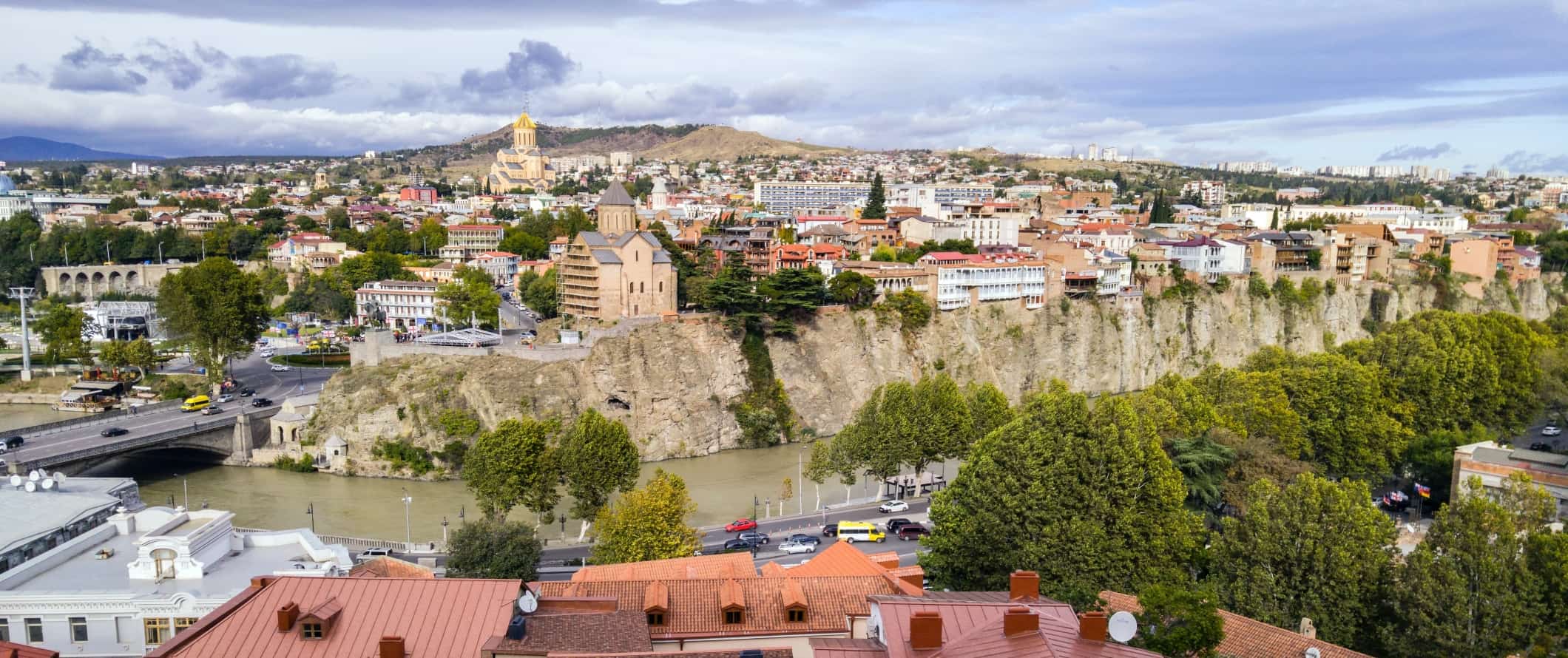
1. Explore Tbilisi
Tbilisi, the capital of Georgia, is incredible. Its cobblestoned old town has ancient streets, beautiful buildings, and thermal baths. Its modern district is filled with old Soviet buildings turned into co-working and art spaces. It’s a fun, youthful, energetic city. Stay awhile.
2. Check out Batumi
Batumi is the country’s famous Black Sea resort and port city, with a beautiful waterfront promenade, parks, and beaches. The towering Alphabetic Tower, adorned with Georgian script, has a seaside observation deck at the top (10 GEL). The old town district is lined with renovated 19th-century buildings.
3. Explore Stepantsminda
Located on the Georgian Military Highway, Stepantsminda is a valley town at the foot of Mount Kazbek. Often referred to as Kazbegi (its former name), it’s home to the famous hilltop silhouette of Tsminda Sameba Church. It makes a great base for hiking, climbing, and mountain-biking.
4. See Mtskheta
Mtskheta, the country’s former capital, is one of the oldest cities of Georgia. As the birthplace and one of the most vibrant centers of Christianity in Georgia, Mtskheta was declared as the “Holy City” by the Georgian Orthodox Church in 2014. It’s another must see place in the country.
5. Tour Gelati Monastery
One of the most spectacular monasteries in the country is the Gelati Monastery outside of Kutaisi. It is widely regarded as a masterpiece of Georgian’s Golden Age. It’s one of my favorite places in the entire country — it’s just beautiful. Free admission.
Other Things to See and Do in Georgia
1. visit vardzia cave monastery.
This unique monastery was built into the side of Erusheli mountain during the Georgian Golden Age (11th-13th century) for Queen Tamar the Great as a sanctuary to hide from invaders. The fortress contains 6,000 apartments as well as a throne room, 25 wine cellars, a bakery, and a large church. Today, the monastery is occupied by a small number of monks with about 300 of the original 6,000 apartments in use. It is easy to get here by marshrutka (minibus) from Akhaltsikhe. The journey takes about 1.5 hours. Admission is 15 GEL.
2. Wander the Batumi Botanical Garden
Located 9 kilometers (5.5 miles) from Batumi, these expansive gardens are located on a hillside overlooking the sea, covering over 275 acres. The main trail takes about 1.5 hours, on which you can see a diverse range of flora and fauna as well as waterfalls and a river in which you can swim. There are nine sections to the park, including areas dedicated to plants from the Caucasian subtropics, the Himalayas, the Mediterranean, New Zealand, East Asia, and more. The entrance fee is 8 GEL and camping overnight is possible for 20 GEL (includes admission).
3. Take a day trip to the town in a cave
Founded in the late Bronze Age, Uplistsikhe Cave Town is an ancient rock-hewn town located outside Gori. The area has been inhabited for thousands of years, and between the 6th century BCE and the 11th century CE, this was one of the most important political and religious centers in the country. The town was abandoned in the 13th century after multiple invasions by the Mongols. Admission is 15 GEL.
4. Soak in the sulfur baths
Mineral sulfur baths are central to the history and culture of Georgia’s capital. In fact, Tbilisi comes from the word for “warm place.” Although there were once 63 bathhouses in Tbilisi, sadly, there are now only a handful left. The baths are still wildly popular and are supposed to have healing powers and be good for your skin. The historic bathhouses straddle a small river that feeds them and then meanders through a canyon leading to the amazing Dzveli Tbilisi sulfur waterfall. Prices for an hour soak start at 20 GEL at public facilities and go all the way up to 200 GEL for a private room in fancier bathhouses. You can also opt to get a scrub down for an additional 10-20 GEL.
5. Visit Svaneti and the Caucasian Mountains
One of the most visited places in the mountains is Svaneti, thanks to its hundreds of ancient watchtowers dotted around the landscape. Historically, these watchtowers were used to keep citizens safe from invaders. While you can fly there, I’d recommend taking the long winding road through the mountains. It’s more scenic and there are lots of great photo ops.
6. Explore the Caves of Gareji
Located on the border with Azerbaijan , the David Gareji monastery complex consists of hundreds of rooms and churches, constructed on the side of the hilly landscape. Due to ongoing border disputes with Azerbaijan, only half of the complex is open to visitors. You can easily visit as a day trip from Tbilisi for around 108 GEL or you can travel by bus and stay locally. The entrance fee is 7 GEL, with an audio guide costing an additional 10 GEL.
7. Go Skiing
Thanks to the high Caucasus mountains, there is some really underrated skiing in the country. The most popular resorts are Gudauri, Bakuriani, and Mestia. Expect to pay around 40-50 GEL for a day pass. You can find accommodation from 140 GEL a night.
8. Visit the Georgian National Museum
One of the best museums in Tbilisi, this massive museum complex consists of several museums wrapped in one. It has a wealth of pre-Christian gold, silver, and precious stonework from burials in Georgia going back to the 3rd millennium BCE. Most stunning are the fabulously detailed gold adornments from Colchis (western Georgia). On the top floor, the Museum of Soviet Occupation focuses in copious detail on Soviet repression and resistance to it. Admission to all the museums in the complex costs 20 GEL.
9. Enjoy Mtatsminda Park
Mtatsminda Park sits at the top of Mount Mtatsminda overlooking Tbilisi. It’s a famous amusement park with a killer view from the highest point in Tbilisi and is worth the funicular trip just for the view. The park costs nothing to enter, but if you want to go on the rides you need to buy a card for 2 GEL and then top it up to pay. Rides include a Ferris wheel, carousels, water slides, and a roller coaster.
10. See Katskhi Pillar
The Katskhi Pillar is a 40-meter (130-foot) limestone monolith with the ruins of a small medieval hermitage at the top. The site was used between the 9th-13th centuries by an early Christian group called the “Stylites” who were known as “pillar monks.” They would spend long periods of time sitting (or standing) on top of pillars as they believed the practice would bring them closer to God. You cannot ascend the pillar, but it makes for gorgeous views and photos.
11. Visit the Stalin Museum
Stalin’s birthplace of Gori, Georgia, is now home to a weird museum that pays homage to his life (and forgets all the bad stuff he did). The museum takes you through Stalin’s life, from his early years growing up in Gori to his leadership of the USSR and finally his death in 1953. It’s a whitewashed exhibition but worth a visit as it’s a weird experience. Admission is 15 GEL including an English-speaking guide.
12. Explore the Tusheti region
The Tusheti region is located in the northeast of Georgia on the northern slopes of the Caucasus Mountains. If you want to go hiking in Georgia and get off the beaten path, head here. It’s incredibly beautiful and panoramic, and many people hike village to village to stay in guesthouses. The Omalo Loop Trek is a good one, although long (it takes several days). If you’re just looking to do some day hikes, do Omalo to Diklo Fort (4 hours) or Ghele to Parsma (8-9 hours).
Georgia Travel Costs
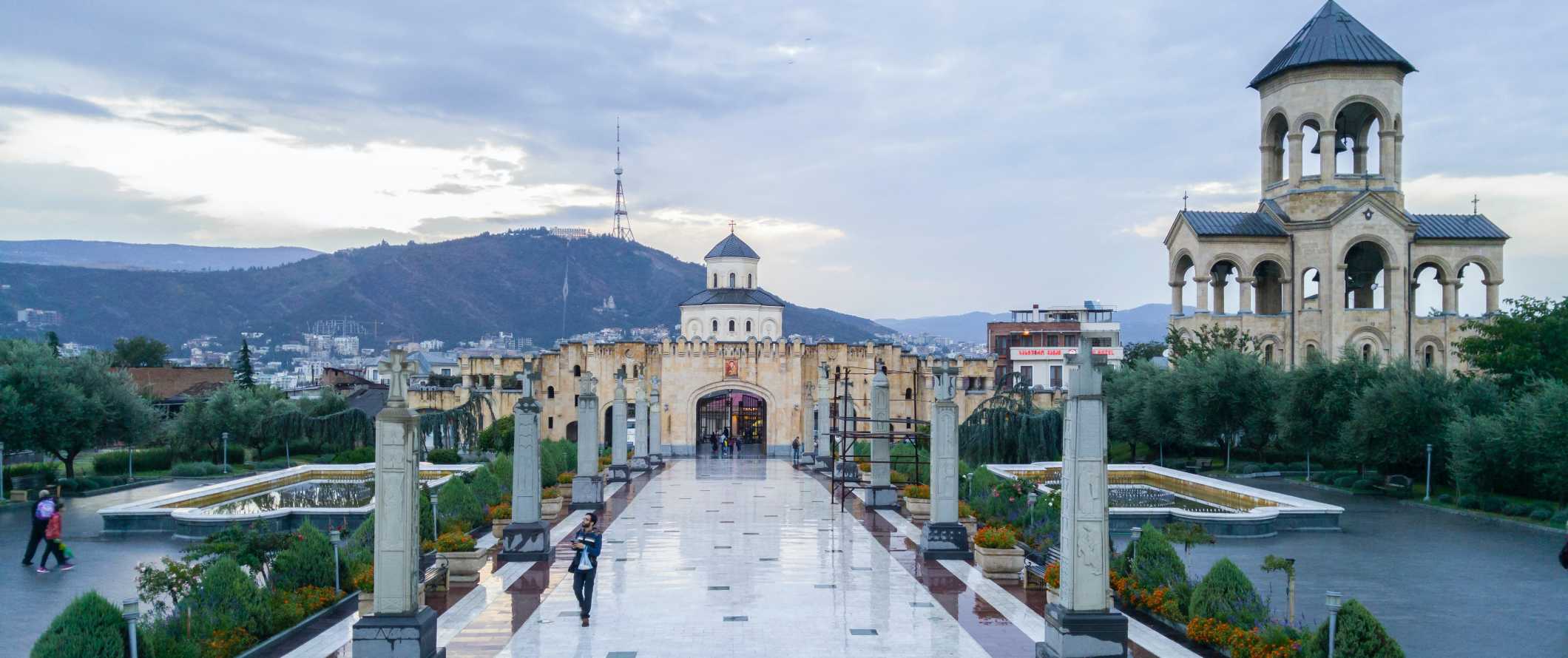
Accommodation – Georgia is a great budget backpacker destination, with a ton of cheap accommodation options. A bed in a 4-6-bed dorm costs around 15-20 GEL per night. For a private room in a hostel, expect to pay around 50-80 GEL per night. Free Wi-Fi is standard and most hostels also have self-catering facilities.
Budget hotels cost between 40-67 GEL per night and come with basic amenities like Wi-Fi, TV, and coffee/tea makers. Mountain guesthouses start from 55-67 GEL and often require a minimum stay of 2-3 nights. Airbnb is another great budget option, with private rooms starting at 45 GEL per night. Entire apartments start at around 60-90 GEL.
Camping is available around the country. There are a few hundred campgrounds scattered around, with prices costing around 10-25 GEL per night for two people and a tent. Wild camping is legal in Georgia as long as you’re not camping on someone’s private property.
Food – Georgian cuisine is a flavorful and healthy mix of meats, produce, fresh cheeses, and lots of spices. Soups and salads are plentiful, as are all kinds of fresh bread. Be sure to try khachapuri (a gooey, cheesy bread), khinkali (Georgian dumplings), bean soup, and sulguni (a popular local cheese). Wine, of course, is the drink of choice and can be found everywhere for incredibly affordable prices.
Overall, food is very cheap in Georgia — especially if you stick to eating the local cuisine. For an inexpensive lunch at a restaurant serving traditional Georgian cuisine, expect to pay around 20 GEL. Fast food (think burger and fries) is around 15 GEL while a medium pizza is 14 GEL.
If you want to splash out, a nicer meal at a mid-range restaurant costs around 35-40 GEL, including a drink.
Expect to pay around 4-5 GEL for a beer and 5-7 GEL for a glass of wine. A latte/cappuccino is around 6 GEL.
If you are planning to cook your own food, a week’s worth of groceries costs between 68-95 GEL. This gets you basic stapes like rice, pasta, seasonal produce, and some meat.
Backpacking Georgia Suggested Budgets
If you are backpacking Georgia, my suggested budget is 70 GEL per day. This covers the cost of a hostel dorm, eating only cheap meals but mostly your own food, limiting your drinking, using public transportation to get around, and sticking mostly to free and cheap activities like free walking tours and hiking.
On a mid-range budget of about 185 GEL per day, you can stay in a private Airbnb, eat out for most of your meals, enjoy a few drinks, take the occasional taxi, and do more paid activities like visiting museums or doing a guided hike.
On a “luxury” budget of 360 GEL per day or more, you can stay in a hotel, eat out for all your meals, rent a car or hire a driver to explore, enjoy more drinks, take taxis when you need to, and do whatever tours and activities you want. This is just the ground floor for luxury though. The sky is the limit!
You can use the chart below to get some idea of how much you need to budget daily, depending on your travel style. Keep in mind these are daily averages – some days you’ll spend more, some days you’ll spend less (you might spend less every day). We just want to give you a general idea of how to make your budget. Prices are in GEL.
Georgia Travel Guide: Money-Saving Tips
Georgia is a great place for backpackers as both food and accommodation are affordable. However, there are still ways you can cut costs even further. Here are some tips on how to save money in Georgia:
- Take a free walking tour – Tbilisi Free Walking Tour offers free walking tours which are a great way to get familiar with the city and the culture. Just be sure to tip your guide at the end!
- Drink the tap water – The water in Georgia is perfectly safe to drink, so an easy way to save money is to bring a reusable water bottle. LifeStraw is my go-to brand since their bottles have built-in filters that ensure your water is always clean and safe.
- Wild camp – If you really want to save money in Georgia, bring a tent. Camping is perfectly legal on public land.
- Cook your own meals – Many hostels here include kitchen facilities, so if you want to save money, book accommodation with a kitchen. Buying your own groceries may not be as glamorous as going out to eat, but it definitely saves money!
- Stay with a local – Staying with a local via Couchsurfing (or similar sharing economy sites) is a great way to save money and meet a knowledgeable local who can share their insider tips and advice.
- Walk everywhere – All of the major towns and cities in Georgia are quite walkable, so skip the public transportation (and the taxis) if you want to save a few extra Lari.
Where to Stay in Georgia
You can find some incredibly cheap accommodation options throughout Georgia. These are some of my suggested places to stay in Georgia:
- Guest House Darejani (Kutaisi)
- Boutique Hotel and Hostel Medusa (Batumi)
- Rock Hotel First Line (Batumi)
- Nino Ratiani Guesthouse (Mestia)
- Nato and Lado Guesthouse (Sighnaghi)
- My Moon Hostel Zugdidi (Zugdidi)
How to Get Around Georgia
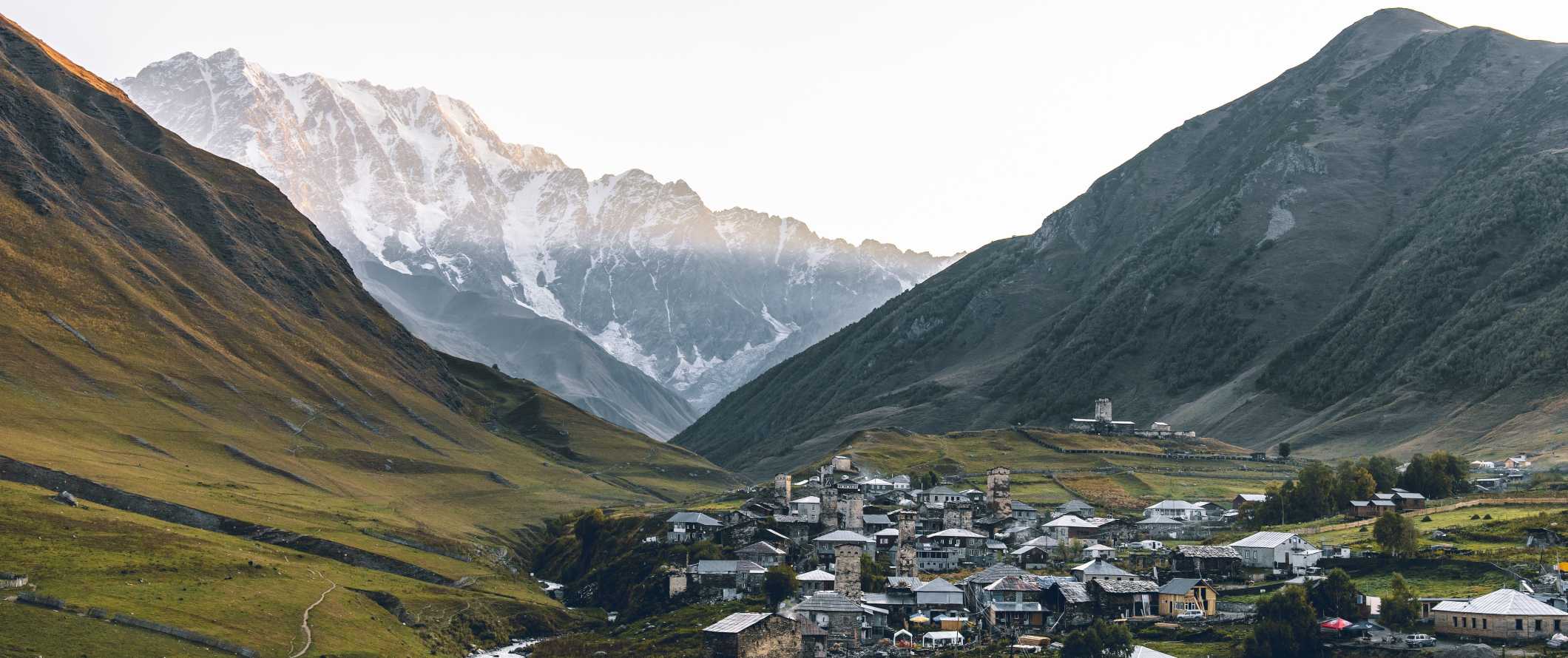
Public Transportation – Larger cities in Georgia are served by buses, mini-buses, and taxis. Tbilisi is the only city that has a metro system, costing 0.5 GEL per ride. You can also get a “Metromoney” card for 2 GEL that gives discounts on Tbilisi public transport and can be topped up as you go.
Public transportation prices vary by city but expect to pay around 0.5 GEL for a standard adult ticket. Most cities are walkable, although Tbilisi, with the exception of the old town, is pretty spread out so you may want to try and navigate the city’s public transport system.
If you need to take a taxi, prices start around 3 GEL and cost around 0.60 GEL per kilometer. Be sure to negotiate a fare before you get in.
Alternatively, if you are in Tbilisi and don’t want to take the bus then you can use Yandex, which is Georgia’s answer to Uber. You can download the app and use it to book a driver. Most journeys cost no more than 5 GEL.
Trains – Train travel within Georgia is slow and most of the trains are old and don’t have AC. If you do decide to travel by train and are traveling in high season, you need to book at least a day or two in advance or risk your train being sold out.
If you are entering or leaving Georgia by train, you can find direct routes from Armenia and Azerbaijan . Prices are very budget friendly with the overnight train from Baku in Azerbaijan costing from 62 GEL for a second-class ticket to Tbilisi. The journey is around 13 hours, so it may be worth paying a little extra for first class (around 100 GEL).
Bus – Buses, known locally as a marshrutka , are the best way to get around the country on a budget. Expect to pay 35 GEL to get from Tbilisi to Yerevan in Armenia.
Airlines – You can fly between Tbilisi and Batumi. Flights cost anything from 215-1,078 GEL so this is not the most economical option. I’d only recommend it if you’re short on time and have lots of money to spend.
Car rental – One of the best ways to see Georgia is by renting a car. This way you are free to roam without restrictions. Car rentals can be as low as 94 GEL per day for a multi-day rental. However, the roads in Georgia really aren’t the best and accidents are common so you’ll need to drive carefully. An International Driving Permit (IDP) is required for renting a vehicle.
When to Go to Georgia
The best time to visit Georgia is during the spring or autumn. Georgia can get extremely hot during the summer months and winters can be bitterly cold, making the shoulder seasons the best time to visit.
As the weather begins to get warmer from April to June, the cities come alive with people taking advantage of the weather. The temperatures also make hiking and outdoor activities more pleasant; the summer can be too warm to hike comfortably. Expect spring and autumn daily highs around 18°C (65°F).
The ski season in Georgia is from December through to April. Expect temperatures to hover around freezing. If you don’t plan on skiing or doing other winter sports, I’d avoid a winter visit to Georgia.
How to Stay Safe in Georgia
Georgia is a very safe country and violent crime against travelers is rare. The only areas to be avoided are the Russian-occupied areas of Georgia in the north (Abkhazia and South Ossetia) where things are still a bit rough and contentious.
As in any destination, don’t flash your valuables and keep an eye out for pickpockets in busy tourist areas and on crowded public transportation.
Solo female travelers should feel safe here, though the standard precautions apply (don’t leave your drink unattended at the bar, don’t walk home alone intoxicated, etc.).
Road accidents are very common so be sure to always wear your seatbelt when in a vehicle and always look twice when crossing busy streets. If you rent car, make sure you don’t leave any valuables in it overnight. Break-ins are rare but it’s always better to be safe than sorry.
Scams here are rare, but you can read about common travel scams to avoid if you’re concerned.
If you experience an emergency, dial 112 for assistance.
Always trust your gut instinct. Make copies of your personal documents, including your passport and ID. Forward your itinerary along to loved ones so they’ll know where you are.
The most important piece of advice I can offer is to purchase good travel insurance. Travel insurance will protect you against illness, injury, theft, and cancellations. It’s comprehensive protection in case anything goes wrong. I never go on a trip without it as I’ve had to use it many times in the past. You can use the widget below to find the policy right for you:
Georgia Travel Guide: The Best Booking Resources
These are my favorite companies to use when I travel. They consistently have the best deals, offer world-class customer service and great value, and overall, are better than their competitors. They are the companies I use the most and are always the starting point in my search for travel deals.
- Skyscanner – Skyscanner is my favorite flight search engine. They search small websites and budget airlines that larger search sites tend to miss. They are hands down the number one place to start.
- Hostelworld – This is the best hostel accommodation site out there with the largest inventory, best search interface, and widest availability.
- Booking.com – The best all around booking site that constantly provides the cheapest and lowest rates. They have the widest selection of budget accommodation. In all my tests, they’ve always had the cheapest rates out of all the booking websites.
- Get Your Guide – Get Your Guide is a huge online marketplace for tours and excursions. They have tons of tour options available in cities all around the world, including everything from cooking classes, walking tours, street art lessons, and more!
- SafetyWing – Safety Wing offers convenient and affordable plans tailored to digital nomads and long-term travelers. They have cheap monthly plans, great customer service, and an easy-to-use claims process that makes it perfect for those on the road.
- LifeStraw – My go-to company for reusable water bottles with built-in filters so you can ensure your drinking water is always clean and safe.
- Unbound Merino – They make lightweight, durable, easy-to-clean travel clothing.
- Top Travel Credit Cards – Points are the best way to cut down travel expenses. Here’s my favorite point earning credit cards so you can get free travel!
Georgia Travel Guide: Related Articles
Want more info? Check out all the articles I’ve written on backpacking/traveling Georgia and continue planning your trip:
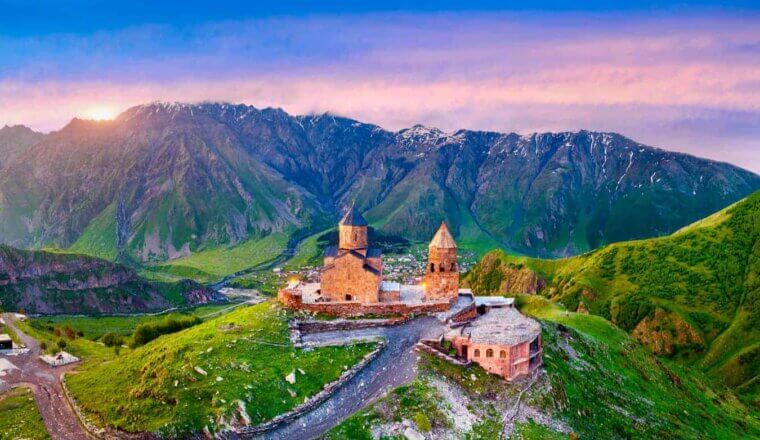
My 15 Favorite Things to See and Do in Georgia
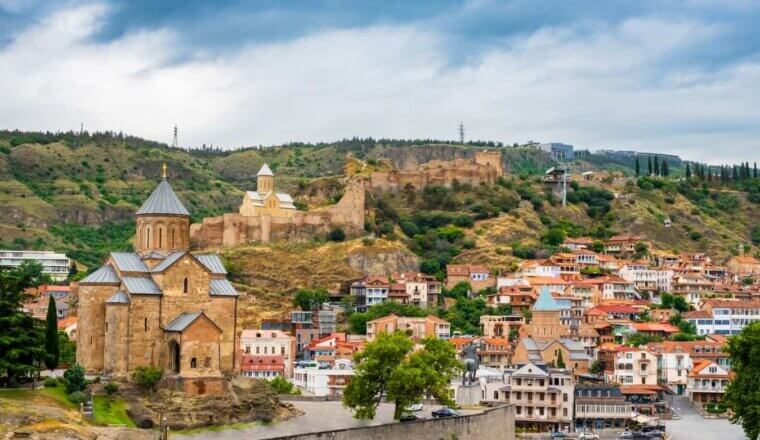
Is Georgia Safe to Visit?
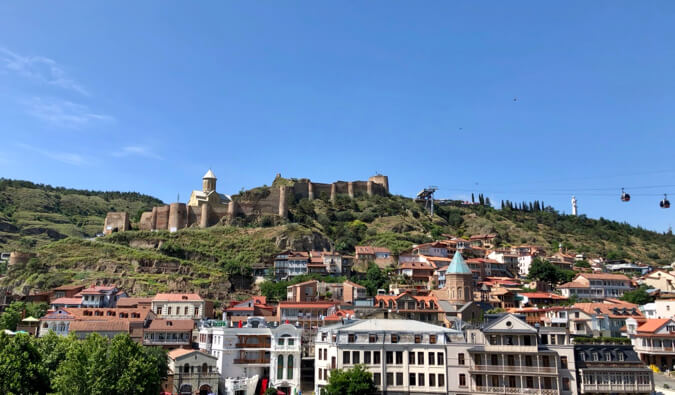
Finding Love and Home in Tbilisi, Georgia
Get my best stuff sent straight to you, pin it on pinterest.
- Where To Stay
- Transportation
- Booking Resources
- Related Blogs
The best 15 books about Georgia
By Joan Torres Leave a comment Last updated on April 25, 2024

Located on the crossroads between Europe and Asia – where tens of civilizations have left their footprint – is the heart of the Great Caucasus, once part of the Soviet Union, the country where Stalin was born, home to a very distinct culture, and the former Soviet country with the strongest national identity.
Georgia is a fascinating destination but, as happens with most countries in this region, both its history and culture are extremely complex.
That’s why, before going on your trip and in order to understand all this complexity, I strongly recommend you read one or two books about the Caucasian country.
In this article, I wanted to show you the best books about Georgia (Caucasus)

The best books about Georgia on:
Table of Contents
- Travelogues
- Travel guides
our recommended travel insurance for Georgia
With its backpacker plan, IATI Insurance is the best insurance for any kind of trekking destination, like Georgia.
Interested in Central Asia? Read: The best books on the Silk Road and Central Asia
The best book on Georgian politics
Please don’t call it soviet georgia – mary russell.
Mary Russell is a British traveler who backpacked across Georgia shortly before the fall of the USSR, and her book describes her first-hand impressions of the rise of Georgian nationalism and the movement for secession from the Soviet Union.
This book about Georgia country that will help you understand why Georgians have such a strong national identity, compared to other former Soviet nations.

Georgia Diary: A Chronicle of War and Political Chaos in the Post-Soviet Caucasus – Thomas Goltz
In this extremely insightful book on Georgia (Caucasus), Thomas Goltz – who wrote similar books on Azerbaijan and Chechnya – tells all the struggles Georgia went through after gaining independence from the Soviet Union, including separatist conflicts (Abkhazia), the war in neighboring Chechnya, corruption, crime, and endless political problems.
The political situation of newly independent Georgia was absolutely nuts from 1991 to 2003, and this book reflects it all in such an intriguing way.

The best books on Stalin’s life in Georgia
As you may know, Stalin was Georgian, and these two books talk about his Georgia-related life.
My Dear Son: The memoirs of Stalin’s mother – Ekaterine Jughashvili
The Ministry of Internal Affairs in Georgia kept a transcript of the memories of Ekaterine Jughashvili’s memories, which they compiled into a revealing book that talks about Stalin’s Youth, as well as her personal life.

Young Stalin – Simon Sebag Montefiore
How Stalin became Stalin.
Simon Sebag is a historian who, based on 10 years of deep research, tells us how a boy born into poverty, yet very talented, became one of the cruelest tyrants in modern history.

The best books about Georgia history
The making of the georgian nation – ronald grigor suny.
History lovers will love this one, the most comprehensive history book on Georgia, covering from the first millennium B.C. to the 21st century, and including a very deep analysis that will help you understand the reality of Georgian nationalism.
Despite the fact that Georgia has been invaded by countless civilizations and empires, the people have always managed to keep a strong national identity and, in this book, Ronald Grigor Suny will help you understand why.

A little war that shook the world: Georgia, Russia and the future of the Wes t – Ronald Asmus
In 2008, Georgia went to war with South Ossetia, a separatist region within Georgia that had the full support of Russia, which ended up into a military invasion of Georgia by Russian tanks that went as far as Gori, an industrial city located only 50km from Tbilisi and today, a very touristic city as it is Stalin’s birth town.
The book talks about this sad episode of Georgia’s history, and not only that but Ronald Asmus affirms that this Russian invasion was a strategy that Moscow had been planning and shaping for years, with the objective of showing the West its influence and power in the 21st century.

The best travelogues on Georgia country
Bread and ashes: a walk through the mountains of georgia – tony anderson.
A fantastically written travelogue!
If you were traveling to Georgia and wanted to read just one book on the country, I would definitely recommend this one.
The author Tony Anderson traveled across the Georgian mountains in 1998, on foot, through Tusheti, Khevsureti, Racha and Svaneti, the four main mountain regions in the Georgian High Caucasus.
In his journey, Tony Anderson discovered something that I have always said in my articles, which is that, despite belonging to the Soviet Union and, basically, being the crossroads of the world, this part of Georgia managed to keep their culture and ancient traditions intact.
This book is great not only for understanding Georgians’ national identity but also for learning about Caucasian ethnicity and culture.

Blind Descent: The quest to discover the deepest place on Earth – James M. Tabour
This isn’t a travelogue as such but it narrates the adventures of an explorer in Georgia.
Did you know that the 2 deepest caves in the world are in Georgia?
Actually, they are not in Georgia (technically), but in the unrecognized republic of Abkhazia .
Krubera cave is a monster cave which was not discovered until as late as 2000, and it wasn’t properly explored until 2004, when Alexander Klimchouk spent months in the depths of this supercave, 2 miles straight down from the surface, and several miles away from the cave’s exit.
In the book, James M. Tabour describes the absolutely crazy and insane adventure Klimchouk went through.

Stories I Stole – Wendell Steavenson
Wendell is a British lady who quit her job at Time magazine and moved to Georgia.
Over 20 chapters, Steavenson narrates her first-hand experiences in the Caucasian country, ranging from vodka-drinking nights to love stories as well as all the political events from the time she was there.
A great book for understanding Georgian culture from a traveler’s point of view.

Novels and other books about Georgia (Caucasus)
Ali and nino – kurban said.
This is one of the most popular books in Georgia, to the extent that one of the most famous monuments in Batumi features the protagonists of this book.
Ali & Nino is the local version of Romeo & Juliet, the love story of a Christian Georgian girl and a Muslim Azeri boy, two lovers with completely different backgrounds, but to make it more interesting and not as cheesy as it sounds, the book is written in the historical context of World War I and the Russian Revolution.

Flight from the USSR – Dato Turashvili
Written by one of the most famous Georgian writers, Dato Turashvili, this novel is based on the unfortunate events of 1983, when 7 young Georgian boys hijacked a plane heading from Tbilisi to Leningrad, in a desperate attempt to escape from the USSR.
They planned to land in Turkey but they failed and were subsequently imprisoned, some of them executed as well.
Dato Turashvili is the master of drama and he is able to reflect the situation in an impeccably compelling way.

For the Love of Wine: My Odyssey Through the World’s Most Ancient Wine Cultur e – Alice Feiring
Alice Feiring traveled to Georgia in 2011, and one of the things that amazed her the most was the country’s wine culture, not only because the wine was as good as any in other famous wine countries, such as Italy or Spain, but also because she met plenty of peculiar characters – from bishops to artists – who still produced it like their ancestors used to.
Alice takes us through tales and stories about all the wine-related people she met on her journey across Georgia.

The best travel books on Georgia
Georgia travel guide – bradt guides.
After the Against the Compass Guide, Bradt has the best book guide about Georgia, with plenty of insights and a great overview of all the things to do in the country.
I always prefer Bradt over the Lonely Planet because they are much more informative.

Caucasus book guide – Lonely Planet
If you are visiting the 3 Caucasian countries in one single trip (Armenia, Georgia, and Azerbaijan), you may want to get the generic guide to the region.
Not a bad guidebook but obviously, the information is quite limited, as they try to squeeze 3 countries in one single book.

More information for visiting Kakheti
📢 In my Travel Resources Page you can find the list of all the sites and services I use to book hotels, tours, travel insurance and more.
Don’t forget to check our travel guide to Georgia .
As well as all our Georgia articles:
- Travel Guide to Kakheti
- Tbilisi Travel Guide
- Georgia Itinerary
- Travel Guide to Kazbegi
- Trekking Guide to Georgia
Leave a Comment Cancel reply
Your email address will not be published. Required fields are marked *
Notify me when new comments are added.
Join our Expeditions
From Syria to Iraq in Pakistan, Against the Compass is finally running expeditions to the most epic and off-the-beaten-track countries.
We have scheduled expeditions for every month of the year.
Latest posts
- How to Travel to Libya in 2024
- Backpacking Venezuela Travel Guide (2024)
- How to travel to Afghanistan during Taliban rule (2024)
- How to visit Los Llanos in Venezuela
- How to visit Angel Falls and Canaima National Park

Georgia Travel Guide
Looking for an in-depth Georgia travel guide ?
Then you’re in the right place!
Is Georgia on your mind? Then this is your sign to start planning a trip to the Peach State!
There’s so much to see in this southern state, so we’ve put together a guide with all the Georgia visitor information you could need. From historic sites to vibrant cities to beaches to breathtaking mountain views, Georgia has a little something for everyone.
The state of Georgia is separated into several different regions, each with its own unique personality.
Up north, you’ll find Georgia’s Blue Ridge Mountains, a gorgeous area offering tons of great opportunities for hiking, fishing, and other fun outdoor activities. Honestly, it’s home to some of the best trails in the world !
At the Chattahoochee River National Recreation Area, you can explore the gorgeous river valley via raft, canoe, or kayak even if you’re a beginner paddler.
Northern Georgia is also home to Atlanta, one of the most populous cities in the United States and a must-visit for anyone looking to learn more about U.S. history. From Oakland Cemetery to Martin Luther King, Jr. Historic Park, the city and surrounding area are full of historic sites that shed some light on the state’s storied past.
Central Georgia offers plenty of southern charm as well as lots of opportunities to get outside.
The Presidential Pathways region in western Georgia is home to five gorgeous Georgia state parks, including the popular Stone Mountain Park.
The region was also a favorite of two U.S. presidents. President Jimmy Carter grew up in the town of Plains, GA (now home to the Jimmy Carter National Historic Site) and Franklin D. Roosevelt even built his “Little White House” in Warm Springs.
Once you take a dip in the lake at Pine Mountain, you’ll definitely see why these great men loved the area so much.
To the east you’ll find the Classic South region, a charming area on the Atlantic coast. Take a swim in gorgeous Lake Oconee or visit Augusta National Golf Club, home of the famous Masters Tournament.
Looking to explore Georgia even further?
Head down to the southern part of the state for gorgeous beaches, cute small towns, and more.
In Scenic Southwest Georgia, you’ll find plenty of quaint southern towns, lush vineyards, and lakeside retreats to explore.
To the east, you’ll find Coastal Georgia, a region known for its gorgeous beaches and islands.
The waterfront city of Savannah is a favorite of many travelers for its old-world charm, vibrant arts scene, and many delicious restaurants.
Jekyll Island and St. Simons Island, once retreats for America’s elite, now offer anyone the chance to relax in style.
Additionally, the more laid-back Tybee Island is also perfect for families looking to chill out in the sand.
Keep reading to dive into resources that will help you with planning a trip to Georgia, a must-visit destination when traveling in America .
Note: This ultimate Georgia guide contains affiliate links to trusted partners!

Georgia Map
Use this Georgia tourism map to begin planning your trip to this incredible country!
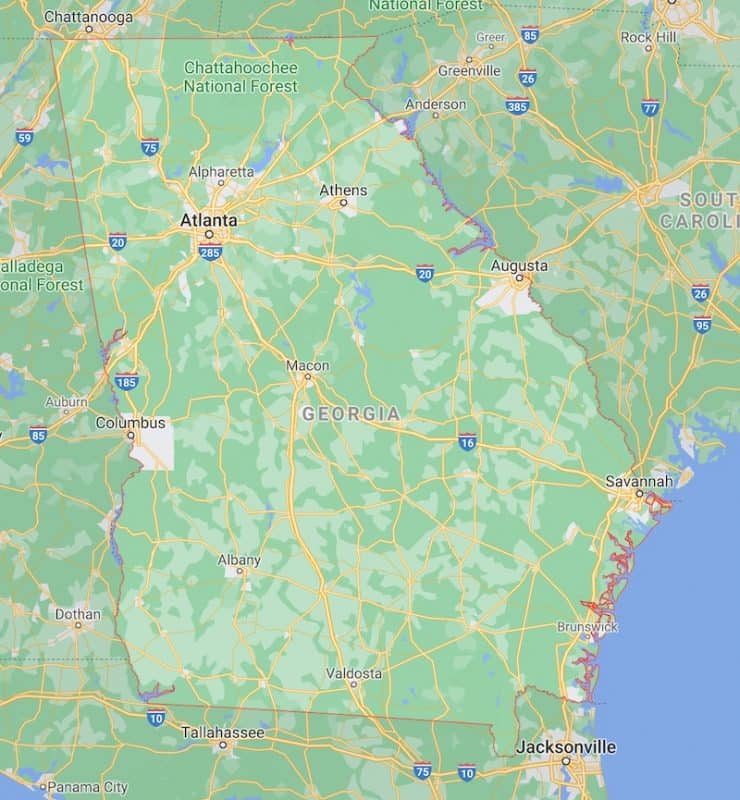
Click here for an interactive Google Map version of the above graphic.
Atlanta Travel Guide
Looking for an Atlanta visitor’s guide ? These posts can help!

Eco-Friendly Atlanta: Green Places To Go, Stay & Eat

Exploring Black History In Atlanta’s Often Overlooked Sweet Auburn Neighborhood

Delicious Discoveries: Exploring Atlanta Through Sunday Brunch
Savannah Travel Guide
Looking for a Savannah visitor’s guide ? These posts can help!

22 Things To Do In Savannah For An Amazing Trip
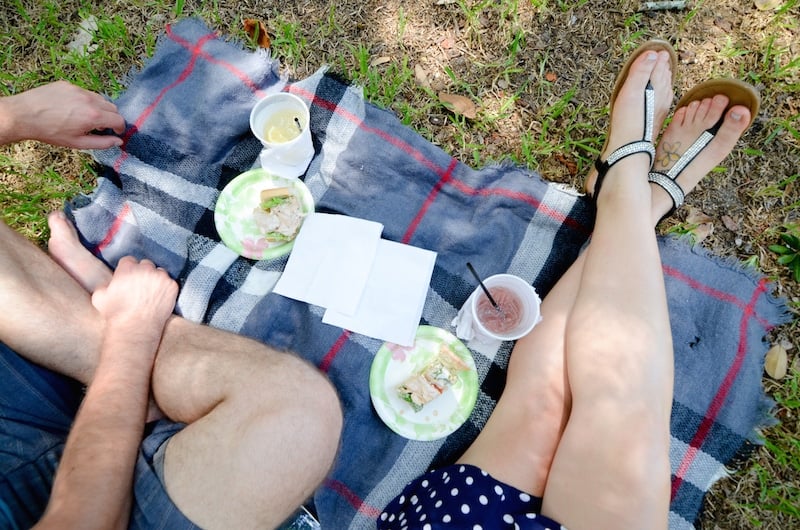
Falling In Love In (And With) Savannah, Georgia
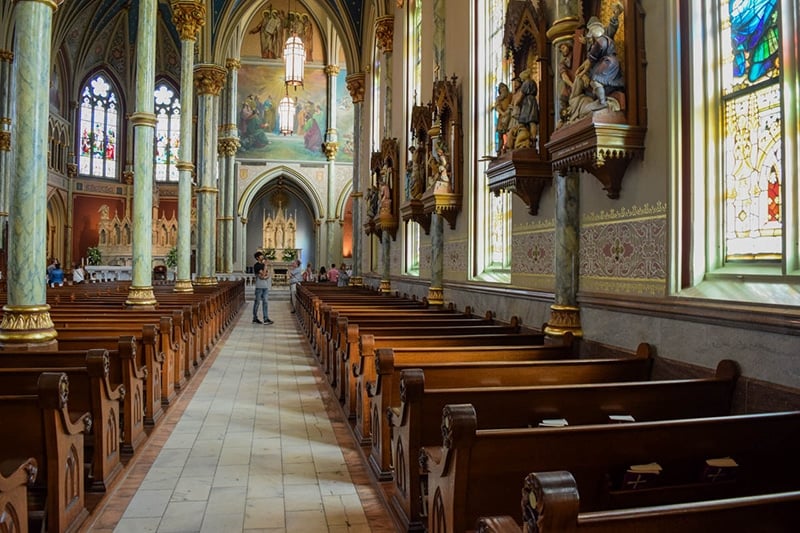
Is Savannah The USA’s Most European City? The To-Go Beer Says “Yes”!
Best Georgia Tours
Explore local culture with a Georgia tour guide through these unique excursions:
- Savannah Riverboat Dinner Cruise
- Savannah’s Historic & Secret East Side Walking Food Tour
- Savannah Bonaventure Cemetery Journey
- Atlanta Black History & Civil Rights Tour
- Ponce City Market Food, History and Street Art Tour in Atlanta
- Tybee Island Paddleboard Tour and Yoga
- Bartram Trail Hike + Wine Tasting Tour from Clayton
Renting A Car In Georgia
Need a rental car for your Georgia trip?
Use Discover Cars to quickly compare your car rental options.
Public Transportation In Georgia
Getting around Georgia by train, bus, or ferry?
Omio is a must! You can use this tool for all of your public transportation needs when traveling around Georgia.
The site is straightforward and user-friendly — and you can pre-book your tickets in advance at a discount.
They even offer flight and car deals!
Georgia Hotels
Click here to browse the best Georgia travel hotels!
Prefer self-contained stays?
Click here to check out unique local rentals!
You can also use this map to search for local properties:
Georgia Travel Insurance
It doesn’t matter if you’re traveling solo or with a group on a Georgia tour. When visiting Georgia — or any other country in the world — make sure to get travel insurance to protect your health and safety.
In my opinion, the best travel medical insurance for travelers is SafetyWing as they’ve got a large network and offer both short-term and long-term coverage — including coverage if you’re traveling for months as well as limited coverage in your home country).
Additionally, SafetyWing is budget-friendly and offers $250,000 worth of coverage with just one low overall deductible of $250.
With coverage, you’ll have peace of mind as you embark on your Georgia travel itinerary.
Click my referral link here to price out travel insurance for your trip in just a few clicks .
Georgia Travel Guide FAQ
Below, find answers to frequently asked questions about traveling in Georgia .
Q: What is the best month to visit Georgia?
The spring and fall seasons are generally considered the best time to visit Georgia. The weather throughout the state is fairly mild during this time, making it the perfect time to explore.
Summers in Georgia can get excruciatingly hot and humid, particularly in areas like Savannah and Atlanta, but you’ll find cooler summer temperatures in the mountains.
Beach destinations like Tybee Island also tend to get extra crowded from Memorial Day through Labor Day, so you may want to consider a visit in late spring or early fall for a quieter, more relaxed vacation.
Q: What should I know before going to Georgia?
There are a few things to know about Georgia before you visit.
If you’re planning on dining out a lot in Georgia, be prepared for big portions. Georgians are very generous when it comes to food and you may be presented with more than your stomach can handle.
Southern food is also fairly heavy, so don’t plan a multi-mile hike after a big lunch of shrimp and grits. Once you taste one of these delicious dishes, though, you’ll absolutely get the hype.
Speaking of food and drinks, sweet tea is the default iced tea option in Georgia. If you want unsweetened iced tea, be sure to let your server know.
There’s usually no need to rent a car if you’re visiting Atlanta. The city has a robust public transportation system featuring a subway, buses, and street cars. This is also the best way to avoid the notorious Atlanta traffic and get to all your desired destinations on time.
And if all else fails, rideshare services like Uber and Lyft are ubiquitous in this big city, so there are plenty of ways to get around.
You’ll also run into lots of classic southern accents throughout the state of Georgia. As it is anywhere else in the world, it’s extremely rude to make fun of the local accent.
Don’t imitate it and if you can’t understand what someone said, just ask them to repeat themselves. A little kindness and respect goes a long way wherever you are in the world.
Q: How much money do you need for a trip to Georgia?
Your budget for a trip to Georgia will depend on your itinerary, but the average traveler spends around $128 USD per day in Georgia on transportation, accommodations, food, activities, and other travel expenses.
You’ll tend to spend more in cities like Atlanta and Savannah and a bit less in rural destinations like the Blue Ridge Mountains.
Q: How many days do you need in Georgia?
For a full Georgia road trip, you’ll probably want to plan for at least one week away.
A seven-day trip will give you enough time to spend a few days exploring the city of Atlanta, nearby destinations like Callaway Gardens and Macon, Savannah, and the Golden Isles of St. Simons Island and Jekyll Island.
Q: What are the best things to do in Georgia?
You’ll find many of Georgia’s top attractions in Atlanta and the surrounding area. Atlanta is home to major museums like the High Museum of Art , the Fernback Museum of Natural History , the Center for Puppetry Arts , and the World of Coca-Cola .
The city is also a major hub of civil rights history .
At the Martin Luther King, Jr. National Historic Park , you’ll find the iconic civil rights leader’s childhood home and gravesite as well as the Ebenezer Baptist Church where Dr. King once served as pastor.
You can also visit the National Center for Civil and Human Rights , a museum dedicated to civil and human rights struggles around the world, in Downtown Atlanta.
For a more laid-back southern vibe, visit Savannah, a coastal city that blends the state’s historic charm with a vibrant art scene.
The city’s smaller size makes it perfect to explore on foot or via a classic trolley tour.
Savannah is home to plenty of historic sites including Bonaventure Cemetery (the setting for Midnight in the Garden of Good and Evil ), the Juliette Gordon Lowe Birthplace (home of the founder of the Girl Scouts), the First African Baptist Church (the oldest Black church in America), and the Telfair Academy (the oldest public art museum in America).
One of the best things to do in Savannah is to stroll through the many parks and squares in the Historic District featuring gorgeous fountains and Spanish Moss trees. While you’re there, stop into some of the galleries displaying works from local Savannah artists.
There are also plenty of ways to enjoy active outdoor adventures throughout the state of Georgia.
The iconic Appalachian Trail runs through the northwestern part of the state and you can enjoy the Blue Ridge Mountains at Chattahoochee National Forest . The forest features tons of trails perfect for all levels of hikers and has both campgrounds and cabins available for those who want to stay the night.
Water sports fans should make a point to visit Callaway Gardens , home to Robin Lake , a major destination for waterskiing and wakeboarding.
Not ready to get out on the lake?
Stroll through the gorgeous gardens featuring hundreds of gorgeous blooms.
And of course, you can’t miss Georgia’s beaches. Jekyll Island and St. Simons Island offer picturesque views that have attracted beachgoers from across the country for decades.
Q: Where is Georgia?
Georgia is located in the Southeastern region of the United States .
It shares borders with Tennessee and North Carolina (north), South Carolina (northeast), the Atlantic Ocean (southeast), Florida (south), and Alabama (west).
Q: Are credit cards accepted in Georgia?
Credit cards — mainly Visa and Mastercard — are widely accepted around Georgia. That being said, it is always wise to carry some cash for smaller establishments and in case of emergency.
Q: Can you drink the tap water in Georgia?
Yes, you can drink the tap water in Georgia.
Q: What is the local currency in Georgia?
The local currency in Georgia is the US Dollar (USD).
What would you add to this Georgia travel guide?

Enjoyed this ultimate Georgia travel guide? Pin it for later!
Wander-Lush
How to Visit Georgia the Country in 2024: The Ultimate Georgia Travel Guide
- The Caucasus
Everything you need to know to visit Georgia in 2024, including up-to-date city and regional guides, insider tips, and a wealth of resources collected from my Georgia travel blog.
Last updated: May 2024
If Georgia (the country) features on your travel wish list, then I have good news for you: There has never been a better time to visit Georgia!
This small but mighty nation in the South Caucasus strikes an almost perfect balance between convenience and a sense of adventure. You can get around Georgia with relative ease while still feeling (at times) like you’re well and truly off the beaten path and experiencing something few other travellers before you have.
If there’s one thing I’ve learned during my time travelling Georgia and living in Tbilisi, it’s that everyone has their own experience of Georgia. Many people (myself included) fall in love and end up moving here.
I love Georgia to bits, but I also have a realistic understanding of the ups and downs involved with travelling here. Since I started writing my Georgia travel blog back in 2017, I’ve always tried to paint a full and honest picture.
This Georgia Travel Guide brings together all my knowledge and experience. I cover everything from transport logistics, safety and budgeting to cultural etiquette and responsible travel tips.
Please note: This page contains affiliate links, meaning I may earn a commission if you make a purchase by clicking a link (at no extra cost to you). Learn more .
Visiting Georgia in 2024
Georgia is open to tourists . There are no longer any special restrictions or entry requirements for Georgia.
If you have questions about Georgia, please don’t hesitate to leave a comment or email me directly. If you’d like some feedback on your Georgia itinerary or you need assistance planning your trip, please see my Itinerary Planning Page .
The Tbilisi City Guide
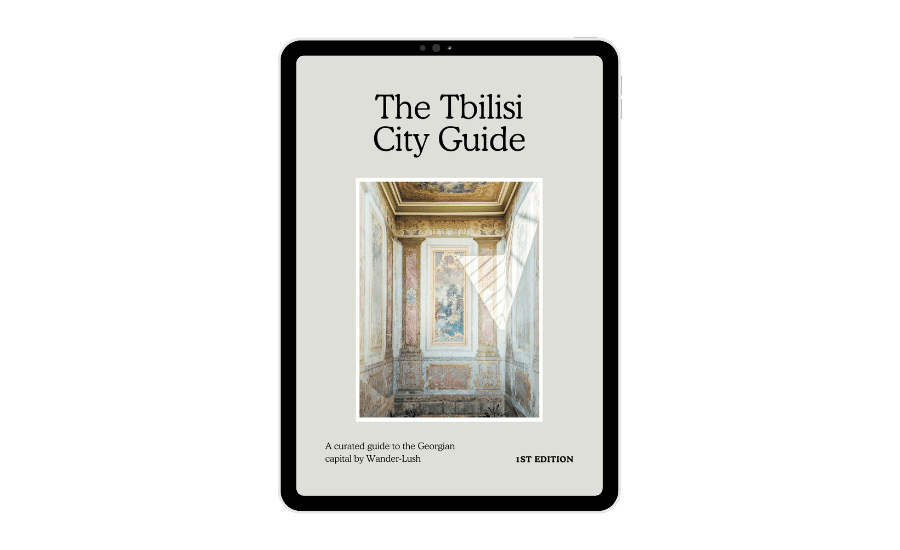
My first guidebook, The Tbilisi City Guide (published March 2024) is a 375-page digital ebook (PDF) that contains everything you need to know before visiting Tbilisi. Made for anyone who wants to go deeper and enjoys exploring on foot at a slower pace, this guide has a strong focus on special architecture, unseen corners, and alternative spots.
Georgia travel blogs
All my 200+ Georgia travel blogs, stories and guides, organised by theme/geography. Each link opens in a new tab so you can bookmark the pages you want to come back to later.
Featured Georgia guides
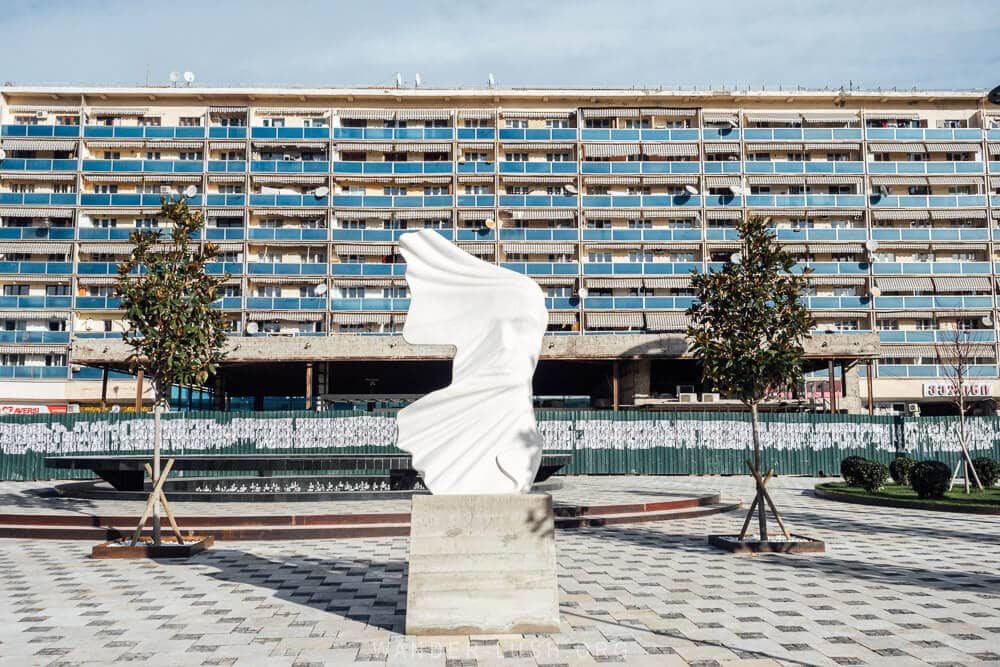
What’s New in Georgia in 2024: New Openings, Trending Destinations & Travel Predictions
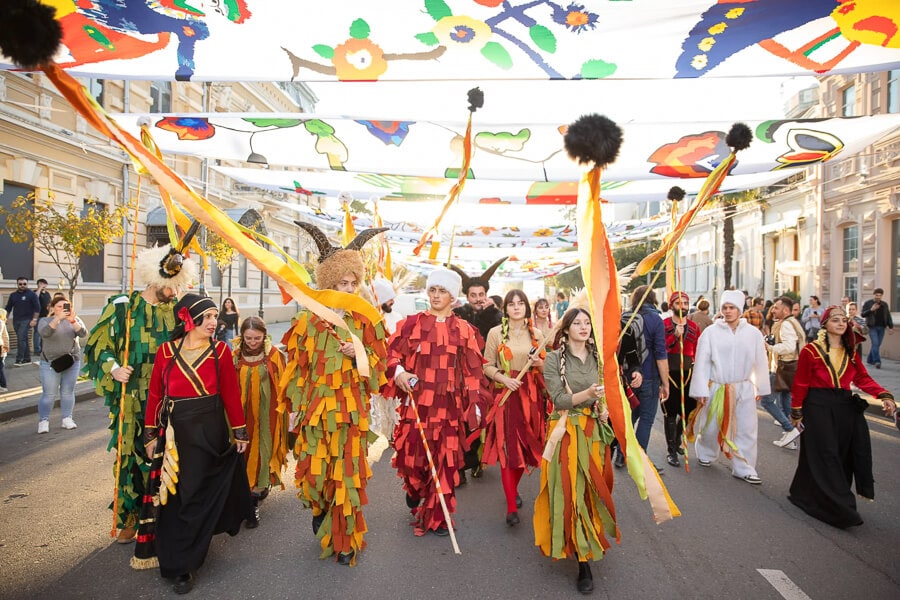
2024 Georgia Calendar: Festivals, Holidays & Milestones to Plan Your Trip Around
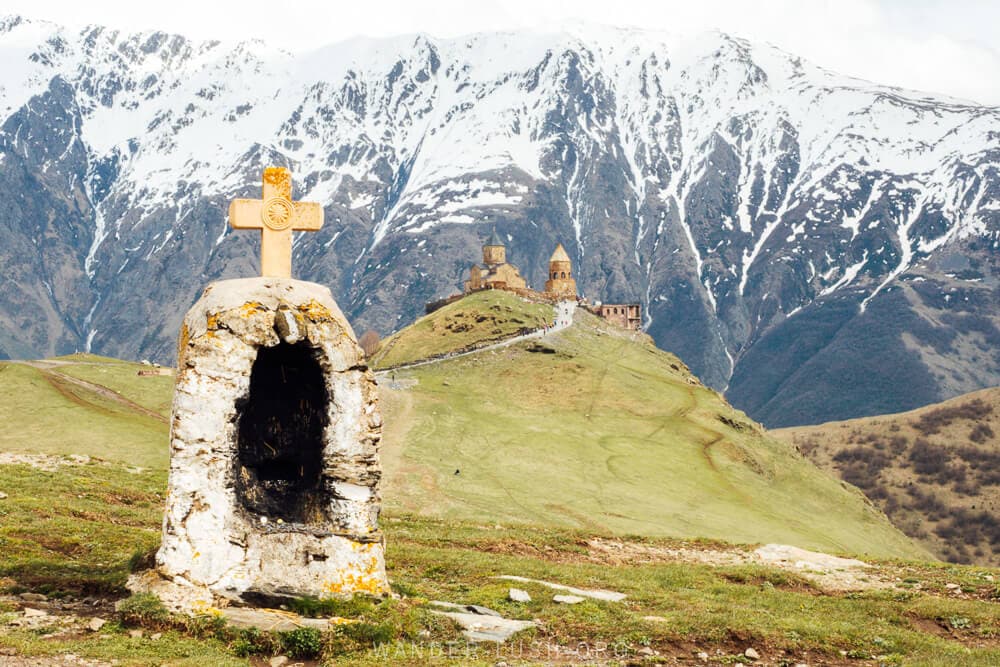
The Ultimate Georgia Itinerary for 2024: How to Spend 1-4 Weeks in Georgia
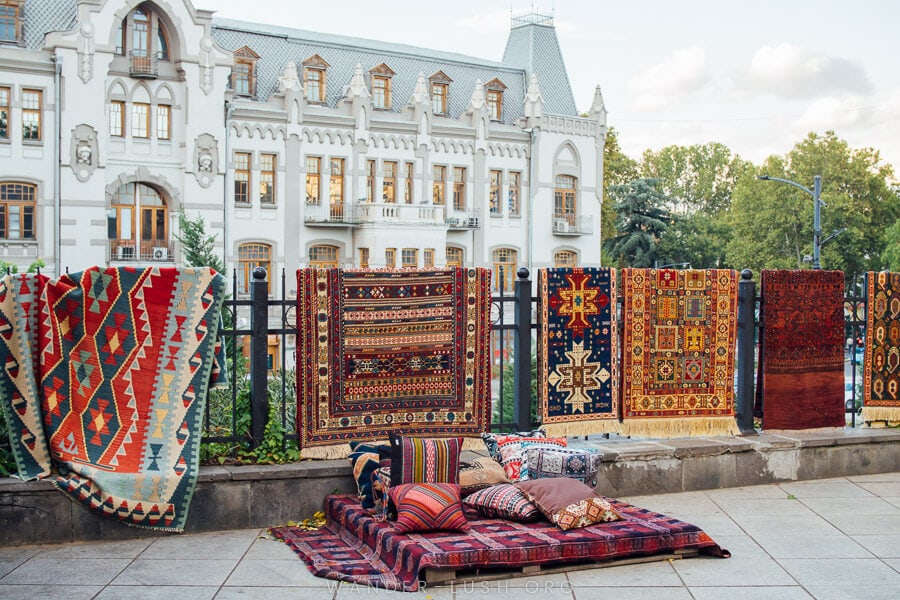
52 Unique Things to Do in Tbilisi: The Ultimate Guide
Popular destinations.

- Unique things to do in Tbilisi
- Best restaurants in Tbilisi
- Best bars in Tbilisi
- Where to stay in Tbilisi
- Detailed guide to visiting the Tbilisi Sulfur Baths
- Where to see live folk music & dance in Tbilisi
- How to visit the Chronicles of Georgia monument

- Kutaisi city guide & 3-day itinerary
- Hidden gems in Kutaisi
- Where to stay in Kutaisi
- Best restaurants in Kutaisi
- How to travel between Kutaisi and Tbilisi
- Chiatura day trip
- Tskaltubo day trip
- Canyons & caves day trip
- Vani Sulfur Pool day trip
- Tskhrajvari day trip
- See all Kutaisi Guides →

- Batumi city guide
- How to get to Batumi from Tbilisi
- How to get to Batumi from Kutaisi
- Batumi Botanical Garden
- Batumi street art guide
- Staying at Kartuli, Batumi’s best hotel
- See all Batumi Guides →

Kakheti Wine Region
- Detailed Kakheti Wine Region guide & itinerary
- How to get to Kakheti from Tbilisi
- Best Kakheti day tours from Tbilisi
- Telavi city guide
- Gurjaani city guide
- Visiting Georgia’s biggest winery
- Best hotels & wine chateaux in Kakheti
- Where to celebrate the Rtveli wine harvest in Kakheti
- Visiting Vashlovani National Park
- Guide to Big Shiraki, abandoned Soviet airbase
- Things to do in Dedoplistskaro
- See all Kakheti Guides →
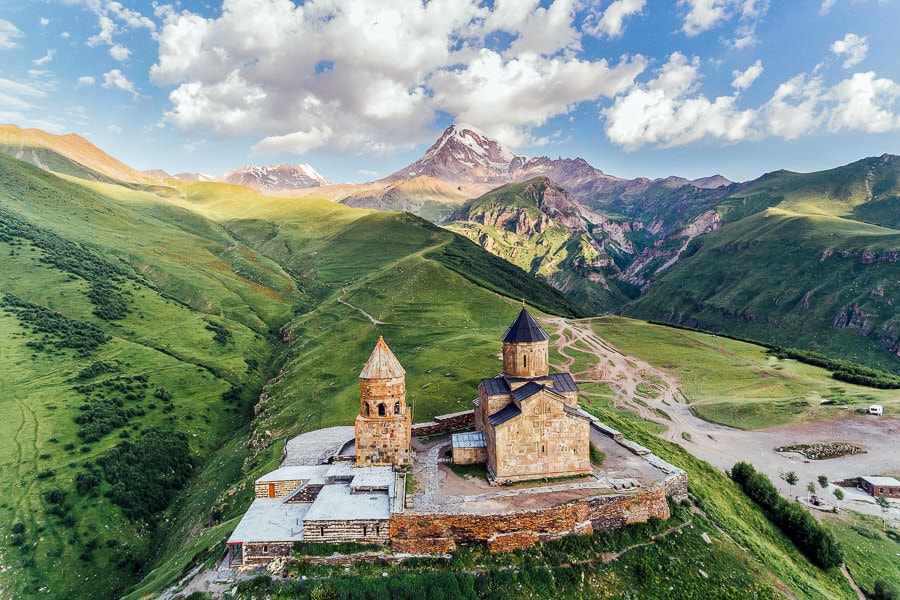
- Detailed Kazbegi travel guide
- How to get to Kazbegi from Tbilisi
- Where to stay in Kazbegi
- Gergeti Trinity Church Hike
- The Kobi-Gudauri cable car
- Where to stop on the Georgian Military Highway
- Visit the the Giant Head Sculptures in Sno village
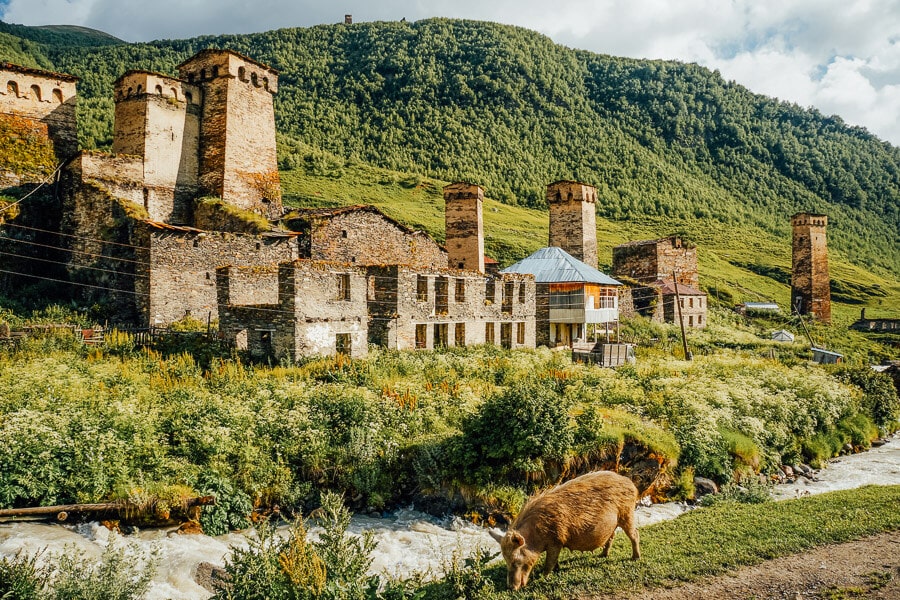
Caucasus mountains
- Kazbegi, Svaneti & Tusheti regions compared
- How to get to Mestia (Svaneti)
- Guide to Tusheti, Georgia’s most remote mountain region
- How to get to Tusheti
- Guide to Racha, Georgia’s alternative mountain region
- Where to go skiing in Georgia
- Things to do in Gudauri on and off the ski slopes
- Gudauri travel tips
- Where to stay in Gudauri
- How to get to Gudauri from Tbilisi
Explore Georgia by region
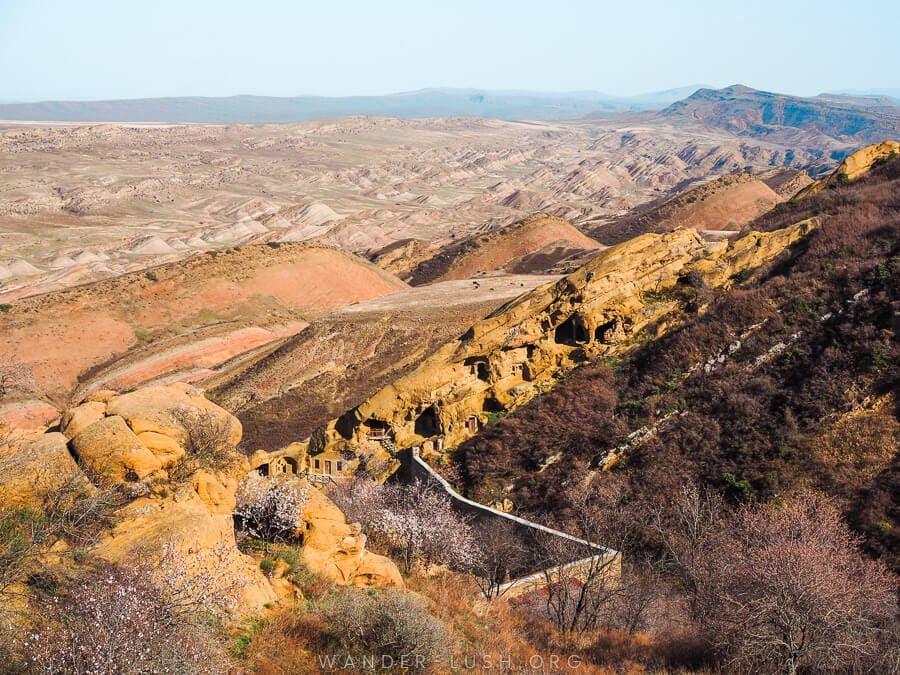
Eastern Georgia
- Mtskheta day trip guide
- Guide to visiting Sabaduri Forest in winter
- What to expect from the Stalin Museum in Gori
- Gori city guide
- Uplistsikhe Cave City
- David Gareja Cave Monastery
- Homestays & Kist culture in Pankisi Valley
- Nazy’s Guest House
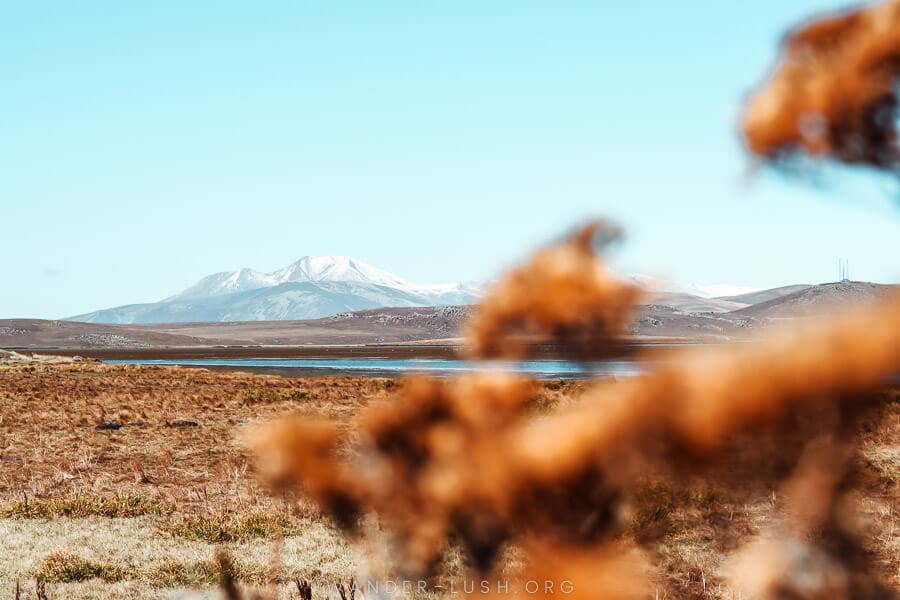
Southern Georgia
- Complete guide to Borjomi
- Vardzia Cave City
- How to get to Vardzia
- Akhaltsikhe city guide
- Rabati Castle
- Guide to Abastumani
- Guide to Meskheti region
- Guide to Tsalka & Javakheti
- Shaori Fortress hike
- Guide to Kvemo Kartli region
- Didgori Battle Memorial
- How to get to Bakuriani from Tbilisi

Western Georgia
- Zugdidi city guide
- Guide to Ozurgeti & Guria, Georgia’s tea region
- Things to do in Zestafoni
- Guide to visiting Martvili Canyon
- Guide to visiting Sairme
- Guide to visiting Sachkhere
- Guide to visiting Kobuleti
- Guide to visiting Poti
- Kolkheti National Park
- Nokalakevi Fortress & hot springs
- Machakhela Protected Areas
- Glamping Tago in Upper Adjara
- Sarpi & the Turkish border
- Guide to the Gonio Cross hike
Plan your trip to Georgia
Here are a few of my favourite resources for travel planning in Georgia.
Georgia travel resources
My best Georgia travel tips and trip planning resources.

Where to go in Georgia
- 40+ places to visit in Georgia
- 15 best day trips from Tbilisi
- 10 best day trips from Batumi
- 6 best day trips from Kazbegi
- 7 best day trips from Borjomi
Itinerary ideas
- Georgia itinerary for 1-4 weeks
- Adventurous Georgia road trip itinerary
- Georgia Azerbaijan itinerary
- Caucasus itinerary
Seasonal guides
- Best time to visit Georgia: month-by-month comparison
- Where to go in Georgia in spring
- Where to go in Georgia in autumn
- Where to go in Georgia in winter
- Tbilisi in summer
- Tbilisi in autumn
- Tbilisi in winter
- Tbilisi in spring
- Where to see wildflowers in Georgia
- Snow in Tbilisi
- Christmas & New Year in Tbilisi
- Orthodox Easter in Georgia
- Kutaisi in winter
Essential travel tips
- 23 travel tips for Georgia
- Georgia safety advice
Responsible travel in Georgia
- Georgia travel budget tips
- Georgia packing list
- Where to buy a SIM card
- Where to store luggage in Tbilisi
Getting around
- How to get from Tbilisi airport to the city
- How to get from Kutaisi airport to the city centre
- How to get from Batumi airport to the city centre
- Tips for using taxis in Tbilisi
- Using GoTrip for budget-friendly transfers around Georgia
- Beginner’s guide to using marshrutka vans in Georgia
- Tips for hiring a car & driving in Georgia
- How to use the trains in Georgia
Special accommodations
- Best guesthouses in Georgia
- Best nature cabins in Georgia
- Glamping tents in Georgia
- Best boutique hotels in Tbilisi
- Best hostels in Tbilisi
- Fabrika Tbilisi
- Karma Hostel Martvili
- Lost Ridge Inn Sighnaghi
- Radisson Tsinandali (Kakheti)
- Tskaltubo Spa Resort
Georgian food
- 50 best restaurants in Tbilisi – the ultimate Tbilisi foodie guide!
- Top 10 Khinkali restaurants in Tbilisi →
- Where to eat breakfast in Tbilisi
- Bets cafes & coffee in Tbilisi
- Tbilisi restaurant etiquette
- Traditional Georgian desserts
- Traditional Georgian drinks
- Vegetarian Georgian dishes
- Meskhetian regional cuisine
Georgian wine
- Tbilisi wine guide – best bars, shops & degustations
- Best wineries in Kakheti
- Best wineries in Imereti
- Visiting Baia’s Wine near Kutaisi
Nature & outdoors
- Hiking in Tbilisi
- Best national parks in Georgia
- Hot springs in Georgia
Handicrafts & culture
- Best Georgian souvenirs & Tbilisi shopping guide
- Georgian designers & labels
- Live music & folk dance in Tbilisi
- Lelo Burti festival in Guria
- Textile lover’s guide to Georgia & the Caucasus
- Visit carpet & felt-makers in Kakheti region
- Visit a clay Qvevri workshop in Imereti
- Visit a pottery studio in Zugdidi
Georgia Travel Guide
This comprehensive travel guide will show you how to plan a trip to Georgia from start to finish. Structured around commonly asked questions, it offers stacks of practical tips and advice – including plenty of insider information you won’t find in any guidebook.
This guide is long and in-depth, so get ready! If you make it all the way to the end I promise you’ll come out the other side feeling more than fully prepared for your trip.
If you don’t have time to read everything or you’re already part-way through your planning, feel free to skip ahead using the links below.
Table of contents
Use these itineraries to start planning your adventure:.

Where is the country of Georgia? Is Georgia in Europe or Asia?
Georgia is located in the South Caucasus or Trans-Caucasus region between the Greater and Lesser Caucasus mountains. It borders Russia to the north, Turkiye to the south-west, Armenia to the south, Azerbaijan to the south-east, and the Black Sea to the west.
That’s the easy part. The second question, ‘Is Georgia in Europe, or is Georgia in Asia?’, is a little more complicated. The response you get depends on who you ask. Georgia is technically part of the Asian continent but to me, it feels more like Europe than Asia. For the most part anyway.
Georgia’s connection to Western Europe goes back to Hellenistic and Roman influences. After the fall of Constantinople, Georgia was seen as ‘the last outpost’ of the Christian world. Today, the country’s gaze is fixed even more resolutely westward, and Georgia aspires to join NATO and the EU. One of my favourite anecdotes on this topic is when Georgian politician Zurab Zhvania famously uttered, “I am Georgian, therefore I am European” when addressing the European Council in 1999.
On November 8, 2023 Georgia was granted EU Candidate status.
Georgia is a crossroads country and has always toed the line. As one historian explained it to me, Georgians were humble and knew they needed to understand both worlds in order to thrive. Shota Rustaveli, the country’s literary hero, was well versed in both Christian literature and Sufi mysticism, for example. On a broader level, these forces combined to produce a unique worldview that influenced everything from Georgian poetry to the electric architecture in Tbilisi Old Town.
As an outpost on the Silk Road trading route , it benefited from centuries of cross-pollination – of religions, cultures, traditions and foods. Georgia took this heady broth of influences and added a pinch of something else to make it its own. The language, cuisine, architecture and spiritual traditions are distinctly, unmistakably Georgian.
One of the joys of getting to know Georgia is grappling with these beautiful contradictions and complexities. Not quite Asia, not quite Europe, Georgia doesn’t fit neatly into either category but rather makes its own rules.
Interesting facts about Georgia
- The country’s official name is Georgia, but to locals it’s known by its Georgian name, Sakartvelo .
- By area, the country of Georgia is almost half the size of the US state of Georgia . With a population approaching 4 million (more than a quarter of whom live in Tbilisi), Georgia has less than half the number of people than the state.
- Georgia was the second state to adopt Christianity as its official religion (the first was neighbouring Armenia). Today the country is predominantly Orthodox Christian and the church plays a very important role in modern society.
- Present-day Georgia was one of the first places where hominins settled out of Africa . In 2000, archaeologists discovered the earliest well-dated hominin fossils in Eurasia – at least 1.8 million years old – at Dmanisi in Kvemo Kartli region.
- Georgia is home to four UNESCO World Heritage Sites : Gelati Monastery, the Historical Monuments of Mtskheta, Upper Svaneti, and its newest listing, the Colchic Forests and Wetlands. Bagrati Cathedral was removed from the register in 2012 (when you visit, you’ll see why).
- Georgia is home to Europe’s highest continuously inhabited village , Bochorna (2,345 metres above sea level) in Tusheti region. Just one man, Doctor Irakli Khvedaguridze, lives there through the winter.
- Georgia is part of the Trans-Caucasus, which is considered one of the most linguistically diverse areas in the world . Not only do Georgia’s mountains offer spectacular views and hiking, they also hold beautiful cultures, customs and cuisines.
- There are more than 250 varieties of artisanal cheeses in Georgia , most of them native to the mountain regions and pastoral areas of Imereti and Adjara.
- Georgia earned the nickname ‘the Cradle of wine’ after archaeologists unearthed the earliest evidence of a winemaking tradition in southern Georgia (grape seeds and residue that are 8,000 years old).
- Georgia has a national holiday for self-care. Bedoba, celebrated every year on January 2, is a ‘day of luck’ that sets the tone for the year to come. It’s a time to do your favourite things – like drink wine and eat cheese!
Why visit Georgia?
Georgia is intriguing – but you don’t fork out for a plane ticket just because a country has an unusual location or it’s the star of trivia night.
Tourism in Georgia has been on the rise in a big way lately, so much so that it’s hard to pick up a travel magazine or scroll through a ‘top destinations’ list without seeing mention of it. The Caucasus region is having a moment, and Georgia is the centrefold.
What is it that draws so many people to visit Georgia? And more importantly, what is it that makes so many people come back again and again? Here are just some of the things that make Georgia special.
They spoke of Georgians as supermen, as great drinkers, great dancers, great musicians, great workers and lovers. And they spoke of the country in the Caucasus and around the Black Sea as a kind of second heaven. John Steinbeck
- The landscapes. In Soviet times, it was said that citizens who lived virtuous lives would be rewarded with an eternity not in heaven, but in Georgia. Even if you’ve never laced up a pair of hiking boots in your life there are countless ways to enjoy Georgia’s natural beauty, from bathing in open-air hot springs to sleeping in village homestays.
- The cities. Beginning with Tbilisi, a city that bristles with creative energy and bubbles with history (quite literally – there’s hot springs right in the centre of town). Every city has its own character. I love them all.
- The food. Beyond the usual suspects khinkali and khachapuri , Georgian cuisine is a parallel universe of flavours and textures you likely haven’t ever encountered before. From regional cuisines such as Megrelian and Rachan to hearty mountain fare and Tbilisi chefs who put their modern spin on the classics, this country is nothing if not a tastebud pleaser.
- The wine. Georgia’s natural wine renaissance has put it on the international map. Qvevri wines made in shapely clay vessels, including full-bodied Saperavi and skin contact amber (or orange) wines, are the most well-known. I can’t think of another place where wine is so deeply intertwined with history and tradition.
- The legendary hospitality. Georgians are known for treating their guests like kings and queens and in my experience, people really are as generous as they’re made out to be. It’s not at all hard to connect with people on a meaningful level. You will never be lonely in Georgia.
- The history. Fair to say Georgian history is lesser-known outside the region. Every castle, monastery, fortress and cave city offers a hands-on history lesson. I find the myths and legends particularly fascinating.
- The Soviet throwbacks. Architecture buffs and urbexers alike are drawn to Georgia because of the Soviet connection. If you’re a fan of Brutalist architecture, abandoned buildings and Soviet-era mosaics, you will love Georgia.
- That other thing I can never put my finger on. There’s an atmosphere, an aura about Georgia that makes it unlike any other country I’ve been to. Part of it, I think, has to do with the country’s turbulent past and ongoing struggles, and the way people have held onto their identity and independence so fiercely through it all. It’s hard to describe, but I hope you understand what I mean after you’ve been around it yourself.
Incredible cuisine, an ancient wine culture, unparalleled mountain landscapes, fascinating cities, old-fashioned hospitality – Georgia has it all and then some.
Georgia highlights: Video
At the start of 2022, I made this short film to celebrate my 2-year Georgia anniversary. It showcases some of my most memorable travel experiences to date.
When is the best time to visit Georgia?
Overall best time to visit Georgia: Late spring or autumn.
The weather in Georgia varies quite dramatically depending on where you go, but the country’s climate is quite mild overall. Generally speaking, the best time to visit Georgia is in either late spring (late April to early June) or autumn (mid September to early November) . These months promise milder temperatures, ideal conditions for outdoor activities and hiking, and a range of cultural festivals and religious celebrations .
Georgia in summer
Good for: Beaches & summer festivals.
Summer (especially July and August) is Georgia’s peak season and by far the busiest time of year for tourism. Resorts along the Black Sea Coast operate at full capacity, and Georgia’s major cities swell to double or triple their off-season size.
Prices for accommodation and tours increase in-line with demand, and it can be more difficult to buy train tickets, for example, as domestic tourism also peaks.
The summer months are most suitable for mountain hiking and lounging on Georgia’s beaches . However, the stifling hot weather in Tbilisi especially (but also in Kutaisi and Batumi) means it’s not the most pleasant time of year to visit the cities.
One major advantage of travelling in summer is that mountain roads (including the Abano pass to Tusheti) are all but guaranteed to be open.
- Read next: How to beat the summer heat in Tbilisi .
Georgia in autumn
Good for: Wine & culture.
Georgia’s high season typically extends to September, but crowds start to dissipate as soon as the weather starts to cool off. The autumn months (September to early November) are a great time to visit Georgia, especially if you’re interested in wine.
The annual grape harvest ( Rtveli ) takes place in September/early October. This is traditionally a time of feasting, festivities and fun, especially in Eastern Georgia’s Kakheti region, the main grape-growing hub. Tbilisoba , Georgia’s biggest cultural festival , takes place in Tbilisi every October.
- Read next: Where to go for the Rtveli wine harvest .
Milder temperatures, scarce rainfall and colourful fall foliage make autumn a great time for hiking and outdoor activities, too.
- Read next: Where to go in Georgia in autumn for fall colours & festivals .
- The best things to do in Tbilisi in autumn .
Georgia in winter
Good for: Quieter cities, Christmas festivities & winter sports.
Tbilisi in December or January is relatively mild compared to other cities in the region; but winters are extremely harsh in Georgia’s mountainous areas. Some remote villages are completely closed off. The Black Sea coast and Batumi empty out over winter, although most businesses remain open.
Aside from the parched landscape and air pollution (a growing problem in Tbilisi), winter can be a very nice time to travel in Georgia, especially in December when blue-sky days are common.
- Read next: The best things to do in Tbilisi in winter .
- Why you should plan a Kutaisi winter city break .
Orthodox Christmas and New Year celebrations (both of which fall roughly a week after their Roman calendar counterparts) give the streets of Tbilisi a festive atmosphere. Georgia’s ski season normally starts in late December and runs through to late April. Resorts in Gudauri and Bakuriani are busy throughout January and February.
Georgia in spring
Good for: Hiking, food & festivals.
Spring, especially late April and May, is one of my favourite times to be in Georgia. Winter usually lingers until Orthodox Easter (mid-April). After that, temperatures warm up, wildflowers and cherry blossoms come into bloom, and conditions are perfect for mountain hiking.
Spring wine, spring produce, and spring celebrations, including the New Wine Festival in Tbilisi, help Georgia thaw out from the cold. Crowds are much sparser than in summer, with the exception of the Nowruz holiday (usually mid-March), which usually sees an influx of visitors from Iran and Azerbaijan.
The downside of travelling in spring is that you may have to contend with heavy rainfall , as May is the wettest month of the year in Tbilisi.
- Read next: The best things to do in Tbilisi in spring .
- Where to go in Georgia in spring .
- Where to see wildflowers in Georgia .
Visa requirements for Georgia
This section provides a broad overview only. For up-to-date visa information or specific advice about your circumstances, please refer to the Ministry of Foreign Affairs of Georgia website .
One year visa-free
Georgia has an extremely generous visa exemption policy. Currently, passport holders from 98 countries (including the EU, Australia, the US and the UK) are permitted to stay in Georgia for up to a year without a visa.
Better still, under the waiver scheme you’re allowed to work (keep in mind that you automatically become a tax resident of Georgia after 183 days in-country), start a business, open a bank account, apply for temporary residency, and even buy property.
Because this is a visa exemption , the visa-free period can easily be ‘reactivated’ by crossing the border and re-entering on a new stamp. This may change in the future but for the time being, if you have the right passport and are prepared to travel once a year, you can legally stay in Georgia for as long as you like.
E-visa & Georgia visa on arrival
Passport holders from an additional 65-plus countries are eligible for either a 30 or 90-day tourist e-visa, which you can get online before you arrive.
- Click here to check if you need a visa for Georgia and to apply for an expedited e-visa through my partners at iVisa.
Other requirements to enter Georgia
To enter Georgia, you might also be required to have the following:
- A passport that’s valid for the intended duration of your stay (or for 3+ months if you’re entering on a visa)
- Proof of insurance for the duration of your stay
- Proof of onward travel (i.e. a return airfare)
Anecdotally, those travelling under the visa exemption are rarely asked to present proof of onward travel or travel insurance at Georgian immigration. Starting from June 1, 2024 new legislation is set to come into effect making health and accident insurance a compulsory requirement for all foreign citizens . More details to come.
If you are travelling on a tourist visa, I strongly recommend you follow the requirements to a T.
Travel insurance for Georgia
Overall, Georgia is an incredibly safe place for tourists, but I definitely recommend taking out a travel insurance policy before you arrive . This is particularly important if you plan on going to the mountains to hike or ski.
Travellers are sometimes required to show proof of travel insurance when boarding a flight to Georgia or at immigration upon arrival.
Standard travel insurance policies cover all of Georgia except Abkhazia and South Ossetia. If you plan on traveling to Abkhazia (entry to South Ossetia is not currently permitted from the Georgian side), then it’s highly recommended to take out a specialised insurance policy that will cover you for emergencies. Note that there are no consular support services in Abkhazia.
- Inquire about a policy with Hey Mondo , my preferred provider for single and multi-trip travel insurance (get 5% off when you book using my link).
How to get to Georgia
Flying to georgia.
Georgia has three international airports in Tbilisi, Kutaisi and Batumi. There are direct flights to Georgia from 40 cities in Western and Eastern Europe, Central Asia, and the Middle East.
Tbilisi International Airport, Georgia’s main hub, is serviced by Georgian Airways (Milan, Munich, Vienna, Amsterdam, Paris, Berlin), Azerbaijan Airways ( Baku ), Turkish and Pegasus Airlines ( Istanbul ), Qatar Airways ( Doha ), Fly Dubai, and IndieGo (New Delhi).
Budget carrier Wizz Air operates direct flights to Kutaisi from cities in Germany, Greece, Italy, Poland and elsewhere in Europe plus Abu Dhabi. Most schedules are limited to 2-3 flights per week. Air Astana operates seasonal direct flights from four cities in Kazakhstan, and Pegasus runs an Istanbul-Kutaisi route. New flights are constantly being added to the rota.
Batumi Airport hosts flights from Turkey, Belarus and Central Asia.
How to get from Tbilisi Airport to the city
There are several options for travelling into the city from the airport: City bus 337, taxi or private transfer. I recommend you avoid taking an airport taxi unless you’re booking it through an app.
- For a full breakdown of the different options, see my Tbilisi Airport Guide .
How to get from Kutaisi Airport to Tbilisi
If your flight arrives in Kutaisi and you want to head straight to Tbilisi, you have several options for getting to the capital directly from the airport. There are two budget-friendly coach services plus private transfers available. Travel time to Tbilisi is approximately 3.5-4 hours.
- For a full breakdown of the different options, see my Kutaisi Airport Guide .
Trains to Georgia
Rail is a convenient way to travel between the three Trans-Caucasus countries. There are overnight sleeper services between Tbilisi and Batumi (summer months only), Armenia and Azerbaijan.
- Read my guide to travelling between Tbilisi and Yerevan by train .
- Read my guide to travelling between Tbilisi and Baku by train .
Entering Georgia by Road
Georgia’s land borders with Armenia, Azerbaijan, Turkiye and Russia are all open for international tourists. Generally speaking, crossing into Georgia overland is a simple and straightforward process.
You can enter Georgian overland using marshrutka vans, private taxis, or by self-driving (if you’re brining in your own vehicle, pre-purchase compulsory insurance here ). Some border points cannot be passed by foot or on bicycle.
From Armenia
There are three checkpoints along the southern Georgia-northern Armenia border.
The two most convenient crossings for travellers are at Bagratashen–Sadakhlo (for travelling from Yerevan to Tbilisi) and at Bavra–Ninotsminda (for travelling from Gyumri or Yerevan to Akhaltsikhe).
From Turkiye
The main checkpoint on the Georgia-Turkey border is at Hopa–Sarpi , 20km south of Batumi. This is the most convenient option for reaching Georgia from Turkey’s Black Sea coast (Trabzon).
A second checkpoint at Posof–Vale may be more convenient if you’re coming from central Eastern Turkey (Kars); however there is no formal cross-border transport so this journey must be done with taxis and local buses. The first city on the Georgian side of the border is Akhaltsikhe.
From Azerbaijan
There are two checkpoints along the Georgia-Azerbaijan border. Balakan–Lagodekhi is used for travelling from Sheki to Kakheti or Tbilisi via Qax. There are direct vans between Qax and Tbilisi.
A second checkpoint at Red Bridge–Sixli south-east of Tbilisi is convenient for entering Georgia from Ganja. From Baku , you can take either route.
From Russia
There is only one land border crossing between Russia and Georgia at Verkhny Lars–Kazbegi in the mountains north of Tbilisi. There are daily direct vans from Vladikavkaz to Tbilisi, travelling via the spectacular Georgian Military Highway .
Is Georgia a safe country to visit?
Georgia is an overwhelmingly safe destination for tourists of all types. Tourists are very rarely targeted by petty crime, and tourist scams are rare. There are certain things to be aware of, most notably road safety and in rural areas, shepherd dogs.
As long as you exercise common sense and caution, are mindful of your belongings, show discretion when interacting with people and take precautionary steps when hiking, then you will have no problems in Georgia. If you’re a solo female traveller, try to pair up with others when hiking or visiting rural areas.
Something that people often ask me about in regards to safety is political instability. You might remember that Georgia went through its Rose Revolution in 2003. Be mindful that border disputes and conflict around breakaway and occupied territories are still bubbling away.
Protests often occur in Tbilisi in response to various political decisions and social issues. These are almost always peaceful but things can escalate, so I still recommend avoiding them whenever possible and finding a different way to show your support.
- See my safety tips for Georgia .
Is Tbilisi safe?
Tbilisi is consistently named among the safest cities in the world. The same rules mentioned above apply in the capital – crime is rare, and tourists are hardly ever targeted. There are a few common scams to be wary of, and a couple of other things you should watch out for:
- Use an app to book taxis
- When purchasing food on the street or at markets, always ask the price first
- Avoid exchanging money at the airport; use an ATM to withdraw GEL instead
- Never go into a bar that isn’t marked on Google Maps
Road safety in Georgia
Road safety is my biggest personal concern in Georgia. I hold my breath every time I get into a taxi in Tbilisi, and it takes me a long time to work up the nerve to get into a marshrutka.
I’ve had a few bad experiences on the roads and I know for a fact that I’m not alone. I don’t say this to spook you, but rather to make you aware that road safety is something you should be on your guard about.
Although the highways are improving year by year, some rural roads – especially in the mountains – are still quite dangerous. The more worrying thing though is the driving style, which borders on reckless. Here are a few general tips to manage your risk:
- Limit very long journeys by breaking up the trip (e.g. by spending a night in Zugdidi between Tbilisi and Mestia)
- Avoid travelling on the road after dark
- Never get into a vehicle if you suspect the driver has been drinking
- Avoid cheap day tours – they often cut corners on road safety
- Use GoTrip transfers for mountain roads rather than marshrutka vans
- Get intimate with the road rules and driving style before you hire a car
Dogs in Georgia
Georgia has a huge population of street dogs – at last count, there are 30,000 in Tbilisi alone. City dogs are generally very placid and friendly towards people, but they can be territorial and aggressive towards each other. You’ll notice that many dogs are tagged with a coloured plastic marker on their ear. This indicates that they have been vaccinated and de-sexed.
If you’re an animal lover, it can be distressing to see so many dogs on the street in the cities and at tourist sites. Most dogs are cared for by the community crowd-sourced style (you’ll even see kennels and water bowls set up from time to time). Unfortunately, not all dogs are in the best shape. If you encounter a dog that needs urgent care, Dog Organization Georgia might be able to assist. You can also contact them about volunteer dog walking opportunities at their no-kill shelter near Lisi Lake.
Shepherd dogs are a different kettle of fish. If you’re hiking in remote areas or even just visiting rural villages, you need to be on the lookout for dogs. They can be extremely aggressive when trying to protect their flocks. Try to give dogs (and flocks of sheep/herds of cattle) a very wide berth. If you encounter an aggressive dog, stand your ground and call out for help – oftentimes there will be a shepherd in the area who can call the dog off.
Solo female travel in Georgia
Georgia is generally safe for solo female travellers provided you exercise common sense and caution. Never hike alone, even in the hills around Tbilisi. Always sit in the back when using taxis. Always lock the door to your room at night, especially when staying at guesthouses in rural areas. Avoid accommodations with shared courtyards as they offer very little privacy from the neighbours.
What is the currency in Georgia?
The official currency in Georgia is the lari, abbreviated to GEL (₾). Along with banknotes Georgia also uses coins called tetri. 100 tetri = 1 lari.
- Banknotes in circulation in Georgia are: 5, 10, 20, 50 & 100 lari.
- Coins in circulation are: 1, 2, 5, 10, 20 and 50 tetri, plus 1 & 2 lari.
Even though prices are sometimes displayed in USD or Euros, lari is the only legal method of payment in Georgia and the only currency you need to carry with you. (This excludes Abkhazia and South Ossetia, which use the Russian ruble.)
Exchange rates fluctuate dramatically, and the GEL always increases in value over the summer months then dips back in winter. I recommend checking the official rates before you travel on the National Bank of Georgia website .
At the time of writing:
- $1 USD = 2.67 GEL
- €1 Euro = 2.87 GEL
- £1 British Pound = 3.33 GEL
- $1 Australian Dollar = 1.90 GEL
- $1 Canadian Dollar = 1.94 GEL
Fun fact: Georgia has its own system for measuring inflation. The ‘Khachapuri index’ is based on the cost of flour, milk, eggs and cheese – the basic ingredients to make a Khachapuri.
Cash or card?
Debit and credit cards (and contactless pay) are widely accepted at restaurants, shops and hotels in all cities across Georgia. In Tbilisi, market vendors, taxi drivers and some smaller venues will only take cash payment. Some guesthouses only take cash, even in Tbilisi.
In rural areas, cash is still king. Most towns have an ATM but if you’re going remote, it’s a good idea to carry enough cash on you to cover your expenses just in case.
Most people have no issue with accepting creased or even torn banknotes, so don’t stress about keeping your lari pristine.
Using ATMs in Georgia
ATMs are ubiquitous in Georgia and can be found in every city, town and in some larger villages. You won’t have any trouble finding an ATM in Tbilisi, Batumi, Kutaisi, Kazbegi, Mestia or Borjomi. If you’re travelling to rural areas, I highly recommend carrying cash as access to ATMs isn’t always guaranteed.
My go-to ATMs in Georgia are TBC, Bank of Georgia, Cartu Bank, VTB and Basisbank . All of these brands accept Visa and Mastercard, while AMEX users should stick to Bank of Georgia. Most ATMs have a withdrawal limit of 400-500 GEL and charge a 3-5 GEL transaction fee (this is always displayed on the screen). Cartu Bank and Basisbank have higher withdrawal limits (up to 2000 GEL). Additional fees may be added by your home bank.
It’s possible to withdraw US dollars and Euros from some ATMs in Georgia, but this comes with additional fees.
Top tip: Don’t mistake a paybox for an ATM. Payboxes (ATM-like freestanding boxes that are a bit slimmer and can be found on just about every corner in Tbilisi) are used for paying utility bills, topping up your transport card and other services. They do not dispense cash.
Exchanging money in Georgia
For ease, I recommend you avoid exchanging currency in Georgia and just stick to withdrawing GEL from an ATM. If you need to change cash, avoid doing so at the airport or in the Old Town (the rates are notoriously bad). Rico Credit is a reliable company with exchange desks throughout Tbilisi and Georgia.
How much does it cost to travel in Georgia?
Georgia is known for being a very affordable travel destination and that reputation is well deserved in my experience. Is Georgia cheap? Yes, but I prefer to say it’s ‘value for money’.
Having said that, prices have increased dramatically in the past 24 months due to rising inflation, the increased value of the lari and various global events. The cost of fuel (and thus transport) has gone up noticeably, with fares increasing by 20-30% across the board. Restaurant and accommodation prices are up, too.
On balance, Georgia remains an extremely budget-friendly destination. With the exception of Batumi during summer high season and Gudauri ski resort in winter, prices are relatively consistent around the country. Some ‘touristic’ places such as Mestia, Kazbegi and Borjomi can be a touch more expensive. Kutaisi is a bit more affordable than Tbilisi.
Average costs for Tbilisi
To give you an idea of how much things cost in Georgia, here are some example costs for Tbilisi:
- Mid-range hotel room: 50-75 GEL/night
- Transport card: 2 GEL (one-time cost)
- Single metro/bus fare: 1 GEL
- Taxi ride across town: 5-15 GEL
- Bakery snack: 2-5 GEL
- Meal at a mid-range restaurant: 30-45 GEL/person
- Glass of wine: 7-15 GEL
- Museum ticket: 15-30 GEL
Average budget for one week in Georgia
Budget traveller: ~ 830 GEL (310 USD) per week
Backpacking in Georgia is incredibly affordable. If you stay in hostel accommodation, use public transport in the cities, eat local (Khachapuri is your friend), stick to free activities and use marshrutka vans to travel from place to place, you can easily get by on a (mid-length) shoestring.
Mid-range traveller: ~1200 GEL (450 USD) per week
I fall into this category. This budget should cover you for staying at guesthouses or mid-range hotels, trying all the foods at both budget and higher-priced restaurants, grabbing a coffee each morning and a wine each night, using a combination of public transport and taxis in cities, not skimping on tickets or guides for certain attractions, and using a mix of marshrutka vans and GoTrip transfers to get around.
High-end traveller: ~2200+ GEL (825+ USD) per week
This includes staying at beautiful boutique accommodations, eating at higher-priced restaurants, using taxis and private transfers to travel around, and taking guided tours and private day trips.
- See my detailed break-down of costs in Georgia and top money saving tips .
Should you tip in Georgia?
Tipping is not part of the culture in Georgia and is not considered mandatory by any means. However, tipping has become expected in most service industries, especially in the bigger cities.
Some service providers, especially taxi drivers, refuse to accept tips. The common sense principle that you should only tip if you’re pleased with the service applies.
Knowing that wages are extremely low in Georgia, I almost always tip (unless the service was remarkably poor or the driver was unusually reckless). If you choose to tip, you can use this as a general guide:
- Restaurants, cafes & bars: 10%
- Food delivery drivers: 1-2 GEL
- Taxis: 1-3 GEL when using an app or round-up to the nearest GEL if paying in cash
- Tour guides & drivers: 15-20%
- Free walking tour guides: 25-35 GEL (depending on the length of the tour and the number of participants)
- Hotel staff: Tipping not expected
Top tip: You’ll notice that many restaurants and cafes in Georgia add a 10% service charge onto your bill (on top of the 18% VAT). This service fee doesn’t go to the server, so if you want to be sure they receive a gratuity, leave an extra tip and try to hand it to them personally.
Getting online in Georgia
Georgia is miles ahead of a lot other countries when it comes to internet connectivity. All restaurants, cafes, hotels etc. offer a free connection for guests. If you rent an Airbnb or apartment, internet will be included. Trains do not have WIFI, with the exception of the Stadler train that runs between Tbilisi and Batumi.
Internet speeds range from 20-100 Mbps up/down depending on the venue and location. There is also an open public WIFI network in Tbilisi called ‘Tbilisi Loves You’. It’s not terribly fast or reliable, but it can come in handy for emergencies.
In rural areas, coverage can be a bit spotty. In Kazbegi (Stepantsminda) the network is reliable enough for digital nomads to work up there, but in Mestia (Svaneti) it’s often intermittent.
If you need a reliable internet connection for work, I highly recommend buying a SIM card so you can hotspot your phone if the power goes out.
Buying a sim card in Georgia
Buying and activating a SIM (or eSIM) is both cheap and straightforward. Even if you’re only visiting Georgia for a couple of days, I still recommend buying a sim so that you can use maps and order taxis.
Magti is my preferred provider for coverage, price and service. Prices start from just 9 GEL/week for unlimited 4G.
- Read my detailed guide to buying a sim card in Georgia .
Recommended apps for Georgia
Here are the apps I use on a weekly basis:
- 112 Georgia: Contact emergency services directly & send a GPS location (requires a local SIM). Download for Android / Apple .
- Bolt: For booking taxis. Download for Android / Apple .
- My Magti: For topping up your mobile balance. Download for Android / Apple .
- Tbilisi Transport: Official app for public transport in Tbilisi. Download for Android / Apple .
- Tbilisi Bus Live: Schedules & real-time updates for city buses. Download for Android only .
- TKT.GE: For buying train and event tickets. Download for Android / Apple .
- Yandex Translate: Translates written and spoken Georgian. Download for Android / Apple .
- Wenu: Allows you to place a restaurant/cafe order from your phone (a large number of venues now use QR codes in the place of paper menus). Download for Android / Apple .
- Wolt: Popular food delivery app. Download for Android / Apple .
- Yr.no: The most reliable app for weather forecasts. Download for Android / Apple .
- Wikiloc: Offline trail maps for popular hikes. Download for Android / Apple .
- Biliki: Hiking trails & tourist info. Download for Android / Apple .
Do people in Georgia speak English?
After Georgian – which is of course Georgia’s official language – the two most commonly spoken foreign languages are Russian and English. While older people know Russian, I’ve found that younger Georgians are most likely to speak English as their second language.
If you’re sticking to popular destinations such as Tbilisi, Batumi, Kazbegi, Svaneti, etc. then you will have no problem getting by with just English. If you’re going rural, it can be helpful to know a bit of Russian or Georgian, but it’s not at all essential.
At the very least you should try to learn a couple of key Georgian phrases. People really appreciate it when you show interest in the language – it’s a sign of respect and trust me, it will earn you brownie points.
The Georgian alphabet is pretty easy to master as well, and being able to read bus signs and menus will improve your confidence.
Useful Georgian phrases
- Gamarjoba: Hello
- Naxvamdis: Goodbye
- Madloba: Thank you
- Madloba didi: Thank you very much (big thanks)
- Me ar vici: I don’t understand
- Bodishi: Excuse me (sorry)
- Gemrieli: Delicious
- Gaumarjos!: Cheers!
Resources for learning Georgian
- Learn to Write Georgian Alphabet : This paid mobile app teaches you the characters and how to write them. This is what I used to learn the alphabet.
- Learn the Georgian Alphabet : This free website teaches through repetition and is extremely helpful.
- Hoda Georgia : This YouTube series takes you through basic vocabulary and conversational Georgian. Just a couple of episodes will give you almost everything you need as a tourist.
- Georgian Peace Corps: Online modules and a free PDF workbook. It’s worth downloading if you’re serious about learning grammar. ( This website has reproduced the guide and added some very questionable cover art!)
- Beginner’s Georgian : One of the books I’m using to learn Georgian.
Etiquette in Georgia
Although quite conservative in many ways, Georgia is still a relatively laid-back country. That is to say there aren’t a lot of unspoken rules to abide by or social faux-pas to make (at least for foreigners).
Here are a couple of things to keep in mind:
- Always greet your neighbours. If you’re staying in an apartment block or your accommodation has a shared courtyard, remember to say hello. It’s considered impolite if you don’t
- Don’t be perturbed by stony expressions. I always say ‘thank you’ to the shop attendant and the bus driver – but this is quite uncommon in Georgia. You may be met with a baffled look, but often it turns into a smile. I usually just laugh it off.
- Give up your seat for the elderly/pregnant. Standard practice when using public transport.
- Don’t bin leftover bread. Bread is sacred and shouldn’t be tossed in the bin. Put it in a plastic bag and tie it to the outside of the bin instead.
- Don’t haggle outside of markets. Respectful haggling is normal at markets but not at shops, restaurants etc.
- Don’t worry about finishing your meal. Over-ordering at restaurants is common. No one will judge you if you leave some food on your plate – but please do be mindful of food waste.
- Be sensitive when discussing politics. It’s generally not a problem to talk politics, but it’s not recommended to raise the subject first with a friend or at all if you’re talking to a stranger.
Drinking culture in Georgia
Even having lived in rice-wine-fueled Vietnam and Cambodia, I still think the drinking culture in Georgia is something else. Wine is the beverage of choice for most people, and things are usually quite civil when wine is involved. But if you’re staying in guesthouses or eating out, you will soon be acquainted with wine’s wicked cousin, Chacha .
Chacha is a highly potent (up to 80% proof) liquor made from grape pomace, the byproduct of wine-making. It’s served in shot glasses and thrown back fast. There are ‘artisanal’ fruit and spiced Chachas that are slightly more palatable but for the most part, it’s like drinking ethanol. Wherever there is wine, there is usually also Chacha. You’ve been warned.
If you’re at a guesthouse or on a tour and your host offers you alcohol, it can be very hard to say no. This is especially true for men (women can sometimes get away with it). Once you start drinking, your glass will never sit empty again. Sometimes a meal will spontaneously erupt into Supra (feast) with toasting, in which case it’s impolite not to down whatever’s put in front of you.
The only successful method I’ve heard of for getting out of drinking is to say you’ve just had a rabies vaccination.
On a serious note, never get into a car with a driver who’s been drinking. If you find yourself in a situation where excessive drinking is making you feel uncomfortable, don’t be afraid to give a friendly but firm ‘no’.
Visiting monasteries & churches in Georgia
The Orthodox Church is revered in Georgia and plays an important role in modern society. When visiting churches, monasteries and the like, visitors are expected to adhere to the same dress and behavior code as locals.
Dress code for visiting Orthodox sites in Georgia:
- Women: Covered hair; covered shoulders; covered knees. In some cases a long skirt is required rather than pants.
- Men: Covered knees; covered shoulders; uncovered head.
Most venues supply apron skirts and headscarves that you can borrow, but some more remote churches and monasteries don’t. I always recommend dressing conservatively and carrying a lightweight cotton scarf with you.
Responsible travel is incredibly important in Georgia, especially in regards to the natural environment. Like every country, Georgia faces a host of social issues that are exacerbated by unsustainable tourism. I think it’s important to understand these and be mindful of what’s going on behind the scenes.
- See this guide for responsible tourism tips for Georgia plus a list of social enterprises and ecotourism projects around the country.
What to pack for Georgia
I recommend travelling as light as possible when you come to Georgia, simply because having a lot of luggage can be a pain when you’re trying to get around. Generally speaking, the dress code errs slightly on the conservative side, especially outside the major cities.
Packing essentials include a lightweight scarf (for monasteries), bathers (for the sulfur baths) good walking shoes , and a reusable water bottle (Georgia is known for its mineral waters and tap water is safe to drink in 90% of towns and cities). Pack your Wine Wings so you can safely transport a bottle or two of Georgian vino home!
There are certain prescription medications you can’t buy or carry into Georgia, so be sure to read up if this applies to you.
Trekking gear, camping supplies and winter sports equipment can all be hired when you arrive.
- See my full all-seasons packing list for Georgia .
- Here’s where to store luggage in Tbilisi .
Power adaptor for Georgia
Georgia has a mix of type C (Euro plug) and type F (Schuko plug) sockets. Plugs C, E and F all work in Georgia. Note that the standard voltage in Georgia is 200 V and some electronics from the US – including some hair dryers – will not work here. Incidentally, all accommodations provide a hair dryer so there’s no need to bring your own.
For ease, I prefer to travel with a universal power adaptor. This is the one I currently use .
Transportation in Georgia
Georgia is compact and pretty straightforward to navigate around using a mix of public transportation and private cars for more complex journeys.
City buses & metro
All cities and some towns in Georgia have a bus network. Tbilisi also has an underground metro. For the most part, public transportation in Georgia is user-friendly and extremely affordable.
In the cities, you’ll be using a mix of coach buses and microbuses ( marshrutky – more on those in a moment). In Tbilisi, use the official TTC app to check the main bus routes – you can’t always trust Google Maps.
Fares vary from city to city: In Tbilisi a single fare costs 1 GEL, in Batumi it’s 30 tetri, and in Kutaisi it’s 40 tetri. When you arrive in Tbilisi, buy a rechargeable MetroMoney Card or a new blue Travel Card for 2 GEL.
You can also use a chipped international bank card, but the fares are roughly 50% higher.
- See my full guide to using public transport in Tbilisi .
Like in most big cities, taxis in Tbilisi have a reputation for overcharging tourists. I try to avoid taxis whenever possible, especially when travelling to the city from the airport or the train station.
Instead, you should use a ride booking app, which works for taxis and private cars. There are several to choose from – my preferred service is Bolt (reasonable fares, reliable drivers, clean cars, and a no-smoking policy). In 2024, Uber is set to launch in Georgia.
In small towns and rural areas, taxis are the only way to get around. Shared taxis where you pay per seat are very common for longer journeys.
- See my tips for using taxis in Tbilisi .
- If you’re interested in ride sharing, try Let’s Go (the group works in Georgian).
GoTrip Georgia
GoTrip Georgia is a terrific local service for organising intercity transfers and full-day driving itineraries with a private car and driver. It’s essentially a long-distance Uber.
Drivers are vetted and reviewed, and you can make unlimited stops on your route. Fares (up to 40% cheaper than regular taxis) are set in advance so you never have to worry about negotiating.
- Click here to visit the GoTrip website and start planning your route.
- Read my first-hand review of GoTrip.ge .
Marshrutka minivans
Every trip to Georgia involves at least a couple of marshrutka rides.
Marshrutka vans are fixed-route minivans found throughout the former USSR countries . In Georgia, marshrutka routes connect all major cities, towns and villages. They can be a bit cramped and uncomfortable, and there’s not much room for luggage, but they are a very affordable way to get from A to B.
- Read my complete guide to using marshrutka vans in Georgia , with fares and timetables.
- See my detailed guide to Tbilisi’s main bus depot, Didube Station , with maps and a video tour.
Georgia has an extensive railway network that was mostly developed during Soviet times (in 1932, the first electric trains in the USSR were tested in the Surami pass in central Georgia).
There are several different types of train running today, and not all of them are ideal for travellers. The main rail route, Tbilisi to Batumi, uses high-speed Stadler trains , connecting the two cities in around 6 hours. The rest of Georgia’s trains are older locomotives , which can be uncomfortable and a bit slow. Especially notorious are the ‘electric trains’ used on several routes including Tbilisi to Borjomi and Kutaisi to Sachkhere .
Georgia has one ‘scenic railway’, the Kukushka ‘Cuckoo’ train from Borjomi to Bakuriani. Unfortunately it was suspended in 2020 and remains inactive for the foreseeable future.
- Read my complete guide to using trains in Georgia .
- Check train schedules on the Georgian Railway website .
- Buy your train tickets online through TKT.ge or 12GoAsia .
Driving in Georgia
If you’re an experienced and confident driver, hiring a car is a great way to get around Georgia. Some agents don’t require you to present an international driver’s permit to rent a car in Georgia – you can drive on your home license (provided it meets the requirements) for up to one year. Rates are much lower if you go through a local agent.
I recommend using Local Rent (formerly MyRentACar) to find a good deal on both sedans and 4x4s.
For overlanding and unrestricted off-road driving, I recommend renting from Martyna z Gruzji (use wanderlush for 10% off).
- For insider tips about road conditions, driving style and road safety, check out my complete guide to driving in Georgia .
- And for more inspiration, check out my adventurous Georgia road trip itinerary .
Follow the Roads Department on Facebook to check for road closures and updates on driving conditions. They also have a hotline: +995 322 313 076.
Tours in Georgia
Both city tours and day tours are extremely affordable in Georgia, making this a great way to pack more into your trip if you’re on a short timeline. I’ve done dozens of tours in Georgia and am always impressed with the quality of service and the knowledge of local guides.
I personally use Get Your Guide and Viator to book tours and organised day trips. These aggregator websites both have a lot to choose from, offer payment security and a generous refund policy. Always read the reviews and do your research before you settle on an itinerary (you can find the company name on the tour page).
My favourite local tour companies in Georgia include:
- Friendly.ge – for day trips from Tbilisi (use wanderlush for 10% off)
- Eat This! Tours – for wine tours around Georgia (use wanderlush for 5% off)
- Budget Georgia – for day trips and transfers from Kutaisi (mention wanderlush for 10% off)
If you’re spending a bit longer in Tbilisi, consider joining a day trip organised by Weekend Travelers Georgia . This Facebook group is geared towards long-term travellers and expats and organises hiking and culture-focused trips to offbeat locations.
- Browse all Georgia tours on Get Your Guide .
- See my list of recommended walking tours in Tbilisi .
Accommodation in Georgia
Georgia has a wide variety of accommodations suitable for every budget and comfort level. In the cities, hotels, boutique hostels and guesthouses are the most popular options. Airbnb has become ubiquitous in Tbilisi and is great for longer stays.
In smaller towns and rural areas, family-run guesthouses are usually the best option. As well as private or shared sleeping quarters, most offer full board (hello, amazing home-cooking), and can organise tours and transport on your behalf.
- Browse Georgia accommodations on Booking.com , my preferred booking platform.
- See my curated list of Georgia’s best guesthouses .
Eating & drinking in Georgia
Georgia is a foodie’s paradise. If you live to eat or just eat to live, exploring Georgia’s food scene will no doubt be a highlight of your trip. There’s a good chance one of the things that first piqued your interest in Georgia was the country’s food scene and the legend of the Supra (Georgian feast).
Georgian cuisine is all kinds of yummy, especially indulgent, carb and dairy-heavy comfort foods from the mountains. The fresh produce is unrivalled (Georgia has the best tomatoes on planet earth), while a liberal use of spices and aromatics ensures everything is tasty as can be. Much of the food is naturally vegetarian-friendly .
Georgia’s culinary strengths are threefold: A topography and climate where literally almost anything grows year-round (from kiwis to potatoes), flavours and spices from all four corners, plus a slew of regional cuisines that are all totally distinct.
- See an extended list of my favourite Georgian restaurants in Tbilisi .
- See a shortlist of my favourite restaurants in Kutaisi .
- Download my free PDF guide: ‘Where to Find the Best Khinkali in Tbilisi’ .
- Read my guide to visiting Kakheti Wine Region , including my favourite wineries and wine-tasting tips.
- Read my Tbilisi Wine Guide to find the best wine bars, wine tastings and wine shops in the city.
- Learn how to visit the award-winning Baia’s Wine from Kutaisi.
Here is just a small sample of the dishes and drinks I suggest you wrap your mouth around stat:
5 must-try Georgian dishes
- Khinkali: Georgia’s one and only ‘soup dumplings’ come in a glorious array of flavour combinations, from simple beef and cumin to mushroom and aged cheese.
- Khachapuri: Most people are familiar with Imeretian Khachapuri (a simple round bread layered with cheese) and Adjaruli Khachapuri (the boat-shaped bread served with butter and an egg). There are dozens more regional varieties to try.
- Kharcho with Elarji: This rich beef stew made with walnuts and spices is one of my favourite meals. Always order a side of Elarji (cheesy cornmeal) or Ghomi sticks (fried cornmeal batons).
- Lobio: Stewed kidney beans in a clay pot. Simple, flavourful and soul-confirming.
- Shkmeruli: Chicken cooked in a creamy garlic sauce. The amount of garlic used will blow your head off, in a good way.
5 not-so-typical Georgian dishes
- Chvishtari: Cheesy cornmeal formed into a patty and deep-fried. It’s crispy and oozy and stringy and amazing.
- Borano: Melted cheese smothered in melted butter. Need I say more.
- Gebjalia: A Megrelian dish of cheese ‘rolls’ served in a cheesy yogurt sauce with mint. I hope you like cheese!
- Apkhazura: ‘Meatballs’ of beef or pork and pomegranate, wrapped in caul fat.
- Tatara / Pelamushi: A dessert made with grape juice – like a soft version of Churchkhela.
5 must-try Georgian wines
Georgia has more than 500 documented endemic grape varieties (many now extinct) and well over 10,000 wineries of various sizes. Kakheti is the main wine region, but vines are cultivated almost everywhere – including in smaller wine regions in Lower Racha, Upper Adjara, Guria, Kartli and beyond.
You may already be familiar with Saperavi and amber wine. Here are 5 more Georgian grapes to add to your hit list:
- Kisi: A young and vibrant wine with aromas of ‘pear, marigold and walnut’. Light and refreshing (and perfect for day drinking!).
- Krakhuna: Full-bodied, aged amber wine with a deep straw-like gold colour and a higher alcohol content.
- Khvanchkara: This famous semi-sweet wine from Lower Racha is often treacle-thick and berry-sweet. Apparently this was Stalin’s wine of choice – but don’t let that put you off.
- Otskhanuri Sapere: Native to Imereti, this wine has a brilliant ruby red colour and coarse texture, with high tannins and acidity.
- Shavkapito: Grown in Kartli region, these grapes make a variety of different wines depending on where they’re grown. I love the sparkling pink Shavkapito myself.
If you want to learn more about Georgian wine, I highly recommend the Wines of Georgia website .
Vegetarian & vegan in Georgia
A surprisingly large number of Georgians fast several times throughout the year for religious holidays (devout Orthodox Christians fast every week on Wednesdays and Fridays). Because of this, the vast majority of restaurants, cafes, bakeries and grocery stores with ready-made meals offer a ‘fasting menu’ or Samarkhvo in Georgian, with items that are free from animal products and oils. Note that some fasting meals still contain honey.
If you don’t eat meat, you’ll be chuffed to know that many Georgian dishes are vegetarian-friendly by nature – Ajapsandali , mushroom Khinkali, Pkhali and eggplant rolls, to name just a few.
Vegans will find eating out in Georgia a bit trickier. There are plenty of veg and vegan-friendly specialty restaurants around ( see listings here on Happy Cow ), some of them serving Georgian dishes and others focusing on international cuisine. Most guesthouses will happily cater to special dietary needs as long as you give them some warning.
Mealtimes & eating out
Most people in Georgia eat late – lunch at around 2-3pm and supper at around 9-10pm in summer is common. There is virtually no breakfast or brunch culture in Georgia, although some early morning cafes have started to pop up in Tbilisi. Most restaurants are open from midday until late (without a break) and serve food all day.
- See my mega list of the best breakfasts, brunches & buffets in Tbilisi .
Georgian food is always served family style in the centre of the table. Sharing is the norm. Smoking is banned in restaurants. English-language menus are widespread. Service is staggered, and plates often come out in an awkward order. Portion sizes are consistently generous at most restaurants, and over-ordering is common.
Georgian handicrafts & souvenirs
Georgia’s vibrant heritage craft scene was one of the first things that drew me to visit the country. There are dozens of artisans and makers working to preserve and modernise traditional techniques such as felting, pottery and wax-resist printing. If you’re interested in learning more, the Georgian Heritage Crafts Association is a great place to start.
On top of that, Georgia has an incredible edible artisan scene! Every time I fly out of Georgia it’s always with a bag full of spices.
- Read my guide to the best Georgian designers & independent labels .
- See my Tbilisi souvenir shopping guide & map .
Save some room in your luggage for these classic Georgian souvenirs:
- Lurji Supra: Georgia’s famous ‘blue tablecloths’ are printed with traditional medallions depicting fish, cutlery and other food-related figures. The best Lurji Supra are hand-printed on cotton.
- Cloisonne enamel jewellery: This traditional technique is hugely popular in Georgia, with many jewellers crafting delicate brooches, necklaces and rings from colourful enamel.
- Clay pottery: It’s a bit tricker to take home, but a piece of Georgian pottery is a wonderful souvenir – whether it’s a simple clay Ketsi dish or an ornately painted wine jug.
- Knitted slippers: Popular for wearing indoors during winter, you’ll see these slippers in an array of colours and designs sold all over Georgia.
- Adjika & Georgian spices: Dry Adjika, marigold, Svanetian salt and blue fenugreek are just a few of my favourites. I particularly like the Waime! brand.
- Churchkhela & dried fruits: If you’re allowed to take fruit products home with you, pick up some Churchkhela , Tklapi fruit leather, jams and preserves (pine cone jam is very unique), and maybe even a bottle of Tkemali sour plum sauce.
Top 10 things to do in Georgia
Wondering what to do in Georgia apart from eat, drink and shop? I’m not exaggerating when I say this country has something for every interest, travel taste and budget (see my itinerary suggestions below for more).
There’s so much on offer, it’s extremely difficult to narrow it down into a shortlist. If you asked me to choose just 10 must-dos in Georgia, here’s what I would pick…
- Go for a scrub-down at the Tbilisi sulfur baths
- Drink wine from the Qvevri in Kakheti
- Drive on the epic Georgian Military Highway
- Hike from Kazbegi to Gergeti Trinity Church
- Visit a medieval cave monastery
- Go inside a tower house in UNESCO-listed Ushguli
- Swim on a black-sand beach
- Visit the semi-abandoned spa town of Tskaltubo
- Stay at a family guesthouse in a small village
- Ride on Stalin’s Rope Roads in Chiatura
- Don’t forget to grab a copy of my free ebook: ‘365 Things to Do in Georgia’ .
Just as there are hundreds of things to do, there are dozens and dozens of beautiful places to visit in Georgia. You’d be hard-pressed to find a country so diverse in its landscapes and cultures. Where else in the world can you wake up in the mountains, drive through a primordial forest then be on a black sand magnetic beach by dinner time!?
Below is a brief overview of some of the key cities and areas to see in Georgia.
- View the full list: The best places to visit in Georgia this year .
Georgia’s capital city, cultural and culinary hub, Tbilisi needs no introduction. This is the gateway to the regions, the main transport centre, and the best place to start and end your Georgia itinerary.
Aside from being a city of convenience, Tbilisi is a very special place – the anchorpoint for Georgian spirituality and culture that has kept the country moored through centuries of political turmoil and social unrest.
You could easily spend a week or more exploring the city at a slow pace , peeling back the layers of history and influence as you tread the cobbled streets of the Old Town. I recommend setting aside at least 2 full days to do Tbilisi justice, more if you want to incorporate a few easy day trips .
Kutaisi doesn’t feature on every traveller’s itinerary – or if it does, it’s only as an arrival/departure point. Yet Georgia’s fourth-largest city and main hub in the west has its own particular charms.
One of the oldest continuously inhabited cities in Europe and the nation’s former cultural capital, Kutaisi has a lot to offer visitors in the way of history. Gelati Monastery , one of Georgia’s four UNESCO World Heritage Sites, is located on the outskirts of the city, part of a cluster of beautiful churches and monasteries.
Wine bars and restaurants serving up Imeretian cuisine, a wonderful central market, and a leafy city centre makes Kutaisi a very pleasant place to lay down your suitcase for a couple of days. It’s also a great departure point for delving into lush Imereti region – known for its waterfalls, canyons and caves – and for visiting Soviet-nostalgia destinations including Tskaltubo and Chiatura .
The biggest city on Georgia’s Black Sea coast, Batumi is notorious for its outlandish architecture , bars and casinos. This is primarily a resort city that comes alive in the summer months. But there’s another side to Batumi beyond the beach and boulevard.
The capital of Georgia’s autonomous Adjara region , a distinct part of the country with its own dialect, cuisine and set of traditions, Batumi is brimming with fascinating history, good food and great wine , street art and more – provided you know where to look.
Not to mention that Batumi is home to the country’s most impressive botanical garden and is the access point for some of Georgia’s best national parks , including the pristine Machakhela Protected Areas .
Eastern Georgia (KakhetI)
Georgia’s Kakheti region stretches from the Greater Caucasus in the north to the Azerbaijan border in the south, taking in the country’s entire eastern wing. The former Kingdom of Kakheti, this is where you’ll find some of Georgia’s most iconic medieval monasteries and impressive mountaintop churches.
Kakheti is grape country ; the first known evidence of winemaking was uncovered in archaeological dig sites nearby and today, this is by far the most productive wine region. The Alazani river valley is the heart of Georgia’s contemporary wine-making industry, running north-south and incorporating dozens of villages and chateaux along with the walled town of Sighnaghi and the city of Telavi . The only thing that outnumbers churches is vineyards, many of which can be toured and taste-tested on Wine Route.
Beyond the vineyards, diverse Kakheti also holds the remote Tusheti National Park to the north and the semi-desert Vashlovani Nature Reserve to the south. David Gareja Cave Monastery , the Udabno ‘rainbow hills’ and Pankisi Valley , home of the Georgian-Chechen Kist community, are among the many other places to see in Kakheti.
Gergeti Trinity Church set against the snow-capped Greater Caucasus and Mount Kazbegi is Georgia’s pinup landscape, the symbol for tourism in the country. If Georgia is synonymous with one thing, it’s the mountains that have impressed their influence on everything, from the languages to the food.
Georgia has two main mountain ranges: the Greater Caucasus to the north and the Lesser Caucasus to the south. Kazbegi and Svaneti are the most popular mountain destinations, while lesser-visited Tusheti and Racha offer a more rugged experience.
Central & Southern Georgia
Far-southern Georgia is one of the most visually impressive and culturally diverse parts of the country. Yet it’s also among the least-visited. With the exception of Borjomi and Bakuriani and the cave city of Vardzia , relatively few people spend time here.
Samtskhe-Javakheti region in the country’s deep south is often referred to as ‘the Georgian Arctic’ because of its harsh climate. This is a high-altitude volcanic landscape of craters and gem-like lakes and the perfect place for cycling and birdwatching. Closer to Tbilisi, visitors can learn about scarcely documented German heritage in the towns of Asureti and Bolnisi .
Central Georgia’s Shida Kartli region is home to the city of Gori , famous for the Stalin Museum but with a lot more to offer beyond dark tourism. Uplistsikhe , another of Georgia’s famed cave cities, is located in Shida Kartli, close to Gori.
A complete contrast to the semi-desert east, humid and overgrown Western Georgia is the green heart of the country. With Zugdidi as its capital, Samegrelo region is layered with history – including an unexpected connection to the French aristocracy. It’s also the birthplace of my favourite regional Georgian cuisine.
Western Georgia features magnificent mountain backdrops to the north (Svaneti) and south, with fertile tea and hazelnut country sandwiched in between. One of the best things to do Western Georgia is drive Guria’s Tea Route . The green corridor leads all the way to the Black Sea coast and the resort towns of Batumi, Kobuleti and Shekvetili, then beyond to Abkhazia. South of Batumi, you’ll find ancient Roman ruins and hiking trails in Gonio , swimming beaches at Kvariati , and the iconic border checkpoint building at Sarpi . To the north, there is historic Tsikhisdziri and Poti , Georgia’s ‘Little Paris’ on the Black Sea.
Festivals & cultural events in Georgia
The Georgian calendar is packed with religious feast days, Orthodox celebrations, ‘day of’ village festivals, and plenty of events that celebrate food and wine. Here are just a few of the major calendar events you might like to plan your trip around.
Find a full list of festivals and celebrations here .
Note that dates for most of these events change year to year and sometimes aren’t finalised until a week or two in advance.
- December/January: Orthodox Christmas/New Year – Biggest celebrations on December 31, Bedoba on January 2, the Alilo Parade on Orthodox Christmas Day, and Epiphany in mid-January.
- April: Orthodox Easter – Special liturgies & family celebrations preceded by 40 days of fasting.
- May: New Wine Festival – Unsealing the previous years’ Qvevris.
- May 26: Independence Day – Markets, fireworks and parades for Georgia’s national day.
- August: Tushetoba – Tusheti’s folk fest spotlights Tush culture, cuisine and horsemanship.
- August: Bakhmaro Horse Race – This tradition takes place on Bakhmaro mountain in Guria.
- August/September: Black Sea Jazz Festival & GEM Fest – two of many summer music festivals that take place every year on the Black Sea Coast.
- September/October: Rtveli – Georgia’s annual wine harvest.
- October: Tbilisoba – This city festival celebrates all things Tbilisi.
- October 14: Svetitskhovloba – Mtskheta’s festival day with celebrations and events at UNESCO-listed Svetitskhoveli Cathedral.
Georgia trip ideas for different travellers
Most first-time travellers to Georgia choose to focus on Tbilisi, the wine region and the mountains. I’ve covered my recommended general itineraries for Georgia in this post .
If you have a bit more time to play with – or indeed if it’s your second or third time visiting – then you might consider these alternative trip ideas tailored to different interests.
Georgia for foodies
The destinations should be top of your list for a food-focused voyage around Georgia.
- Meskheti: Georgia’s up-and-coming foodie hotspot (in my opinion, anyway), ancient Meskheti region has a unique cuisine that includes apokhti khinkali filled with dried meat, pulled tenili cheese, and Georgian-style escargot. Read my full guide to Mestkhetian cuisine and food experiences around Akhaltsikhe and Vardzia.
- Samegrelo: My favourite regional cuisine in Georgia belongs to Samegrelo region. Zugididi is a great place to taste regional dishes including Kharcho and Elarji , Gebjalia and of course Adjika . See my restaurant recommendations in this city guide .
- Upper Adjara: The highland villages of Adjara region are home to a distinct, dairy and fat-heavy cuisine. As well as Khachapuri Adjaruli , try Sinori (flaky pie) and Borano (cheese with melted butter).
- Pankisi Valley: Kist (Chechen-Georgian) cuisine is totally unique. Nazy’s Guest House in the village of Jokolo offers home-cooked meals, cooking classes and other unique tourism experiences .
- Racha: This mountainous region is the home of such beloved delicacies as Rachan cured ham and Shkmeruli garlic chicken.
Georgia for wine lovers
If getting a taste for Georgia’s wine culture is your main priority, consider visiting these popular and lesser-known wine regions.
- Kakheti Wine Region: There are hundreds of wineries worth visiting in Kakheti , you could easily spend your entire trip roving around the main wine region. I recommend hiring a car and driver for the day to take you around ( GoTrip is a great option) or for a more in-depth experience, touring with a sommelier-guide .
- Imereti: Also be sure to visit the wineries outside Kutaisi , including Baia’s Wine. The harvesting and wine-making techniques are much the same but the grapes are totally different.
- Shrosha: This small village in Western Georgia is one of the places where clay Qvevris are made .
- Racha-Lechkhumi: Two more thriving wine regions in the north-west. Racha is known for Khvanchkara wine, which you can sample at guesthouses and small cellars around Ambrolauri.
Georgia for hikers
There are plenty of trekking opportunities in Georgia for various fitness levels. Here are a few of the most popular destinations for day and multi-day hikes.
- Svaneti: Choose from the popular 3-day trek from Mestia to Ushguli or alternative routes around Mestia, Mazeri and to Tobavarchkhili lakes.
- Truso Valley: This hiking mecca near Kazbegi features the beautiful Zakagori Fortress .
- Sno Valley/Juta: More trails and the scenic Chaukhi Pass on the opposite side of the valley to Truso.
- Lagodekhi National Park: Don’t miss the 3-day Black Rock Lake hike to the border with Azerbaijan and Russia.
- Borjomi National Park: Pristine forests and well-maintained trails in the Lesser Caucasus.
- For more information about hiking in Georgia, check out Caucasus Trekking .
Soviet Georgia
If you’re interested in all things former USSR, these places are a blast from the Soviet past.
- Brutal Tours (Tbilisi): Walking tours of Tbilisi that cover the city’s most prominent Socialist buildings and monuments.
- Rustavi: This former Soviet monotown and now bustling small city is filled with architecture from the 1940s and 1950s. See my Rustavi Day Trip Guide for all the highlights.
- Gori: The (in)famous Stalin Museum in Gori is a must-visit for anyone who’s interested in Soviet history. To go deeper, book a Soviet Tour of Gori with my friend Zhana and let her show you around her home city in a retro Lada.
- Chiatura: This city in Imereti, north-east of Kutaisi, is famed for its network of cable cars known as ‘Stalin’s Ropeways’ . Perfect for urbexers.
- Tskaltubo: This semi-abandoned resort town is home to dozens of bathhouses and Soviet-era sanatoria , including Stalin’s private bath and suite .
- Samegrelo & Guria: If you’re interested in Soviet-era mosaics, these two regions of Western Georgia are must-sees. Dozens of mosaics adorn bus stops, old factories and schools. This map is a great resource for finding them.
Alternative Georgia
Here’s where to get off the beaten track in Georgia.
- Racha: Georgia’s alternative mountain region is popular with locals but rarely visited by foreigners. Don’t miss Oni (home to a stunning synagogue) or Shovi (home to ‘Stalin’s Dacha’).
- Pankisi Valley: Learn about Kist and Chechen traditions, observe a traditional Sufi Zikr ceremony, and go horseback riding into the Tushetian foothills.
- Vashlovani National Park: Mud volcanoes, rock formations and off-roading.
- Upper Adjara: The highlands back from Batumi are beyond picturesque.
- Guria: Drive Georgia’s Tea Route to discover Soviet-era plantations and small-scale farmers reviving the industry.
- Javakheti Plateau: Volcanic lakes and birdwatching in the ‘Georgian Arctic’.
Georgia for families
Children are worshipped in Georgia and travelling with your little one is a sure-fire way to make fast friends. Georgia is a very family friendly destination overall with no shortage of activities to keep kids of all ages occupied.
- Uplistsikhe & Vardzia: Georgia’s two most popular medieval cave cities.
- Okatse & Martvili canyons: A popular day trip from Kutaisi . For a less-touristy alternative, try nearby Balda canyon.
- Rabati Fortress: This restored Disneyland-like castle in Akhaltsikhe is a lot of fun to explore.
- Nokalakevi: For the open-air archaeological museum and sulfur pools.
- Bakuriani: Kids will love the Kukushka scenic railroad from Borjomi to Bakuriani.
- Shekvetili: Clean swimming beaches on the northern end of the Black Sea coast.
Pre-trip reading & viewing
If you want to learn a bit more about the history, culture and cuisine before you arrive in Georgia then I highly recommend checking out a few of these books, films and TV shows.
Books about Georgia
The Caucasus: An Introduction by Thomas de Waal. An essential introduction to culture, politics and religion in the Caucasus region.
Edge of Empires by Donald Rayfield. A comprehensive look at Georgia’s history through the lens of various invasions and conflicts.
A Little War That Shook the World by Ronald Asmus. Examines the 2008 conflict between Russia and Georgia.
Georgia: In the Mountains of Poetry by Peter Nasmyth. An all-encompassing introduction to contemporary Georgian history, culture and politics based on the firsthand experiences of an expat.
The Eighth Life by Nino Haratischvili. An award-winning novel described as Georgia’s War and Peace .
Ali and Nino by Kurban Said. By far my favourite book set in the region, this fictional classic is partially set in Tbilisi and Baku.
For the Love of Wine by Alice Feiring. An informative, easy-to-read travelogue-style introduction to the natural wine scene in Georgia.
Georgia: A Guide to the Cradle of Wine by Miquel Hudin & Daria Kholodilina. The ideal field guide for exploring the world of Georgian wine.
Tasting Georgia by Carla Capalbo. Recipes and food stories collected from Georgia.
Films & TV shows set in Georgia
- And Then We Danced . This hit movie, partially filmed in Tbilisi, caused a bit of a stir in Georgia when it was released. The Kartuli dance showcased in the movie is phenomenal.
- In Bloom . A coming-of-age film set in post-USSR Tbilisi.
- Hostages . Tells the story of seven young Georgians who attempted to flee the Soviet Union by hijacking an airliner.
- The Loneliest Planet . This 2011 movie was filmed in Georgia and focuses on a couple who trek across the Greater Caucasus mountains.
- Anthony Bourdain’s Parts Unknown . See Bourdain’s visit to Georgia in Episode 5 of Season 7.
- Joanna Lumley’s Silk Road Adventure . Parts of this travel documentary series were filmed in Georgia and Azerbaijan.
- From Russia to Iran: Crossing Wild Frontier . Explorer Levison Wood crosses the Greater Caucasus on foot in this BBC series.
- Last Woman on Earth With Sara Pascoe . Georgia features in Episode 2 of Season 1.
Travelling to Armenia or Azerbaijan from Georgia
Many people choose to bundle at least two of the three South Caucasus nations into one trip. You’ll find that both Armenia and Azerbaijan are a contrast to Georgia – and yet the three nations also have a lot in common.
The easiest and safest way to travel from Tbilisi to Yerevan (Armenia) or Baku (Azerbaijan) is by rail. You can find everything you need to know about using the overnight sleeper trains in my guides:
- Tbilisi to Yerevan sleeper train .
- Tbilisi to Baku sleeper train .
Another option is to travel by marshrutka to Northern Armenia via Southern Georgia’s Javakheti region, or to Sheki in Azerbaijan via Kakheti. See here for more bus travel tips for Azerbaijan.
Remember that the land border between Armenia and Azerbaijan is closed, so you’ll need to travel back through Georgia if you want to visit both countries. There are no restrictions on visiting Azerbaijan after Armenia or vice versa as long as you haven’t been to Nagorno-Karabakh (Artsakh).
Check out my country guides for more travel tips:
- Travel Guide for Armenia .
- Travel Guide for Azerbaijan .
Questions, comments or feedback? Feel free to leave me a comment or reach out via email. I hope this guide proves helpful when planning your visit to Georgia!
Save my Georgia Travel Guide on pinterest for later:

State Organizations A-Z

- Department of Natural Resources
- Wildlife Resources
- Law Enforcement
- Environmental Protection
- Coastal Resources
- Accommodations & Camping
- Enforcement

20% Off This Weekend
Hard Labor Creek Cottages

Tag #GaStateParks
Share Your Adventures

Reptile Programs
Attend 4 for a prize

Combo Passes Available

Surprising 6 State Parks
Discover these surprising sites
Georgia State Parks & Historic Sites Park Guide

The Georgia State Parks & Historic Sites Park Guide is a handy resource for planning a spring break, summer vacation or family reunion. The free booklet is filled with tips on the best hiking trails, fishing spots, cabins, wedding venues and campsites.
Request a free copy by mail or pick one up in any park office.
View Park Guide Online
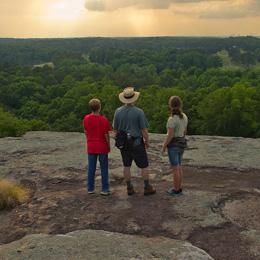
featured destination
Travel to a place that has Old World towers, gingerbread trim, traditional German foodstuffs and strasses and platzes spilling over with Scandinavian goods, a natural beauty perched on the Chattahoochee River.
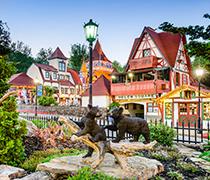
Come to Hiawassee, GA where the Blue Ridge Mountains keep proud watch over beautiful Lake Chatuge. Boating, fishing, swimming, skiing...or just watching the sun set! golakechatuge.com

Experience the best of the North Georgia Mountains: acclaimed trails, heirloom orchards, delightful vineyards, tranquil rivers & charming cabins. You can’t go wrong with a retreat to Ellijay, Georgia!

Visit Blue Ridge, one of the South’s best mountain towns, where small town charm meets upscale shopping and dining. Only 90 miles from Atlanta, but a million miles away from it all. Cozy cabins, beautiful views, lakes, waterfalls and friendly people.
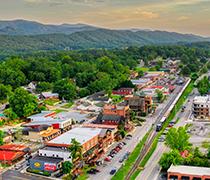
The search for squirrel picnic tables is on! Explore Henry County and find not only tiny, decorated squirrel dining spots throughout the community, but also an array of outdoor adventures waiting to be explored just 20 miles south of Atlanta.
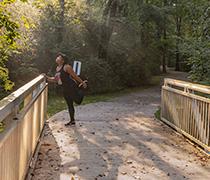
Blairsville offers the perfect mountain getaway. Spend days filled with delectable local dishes, uncommon shopping experiences, magnificent views, and nights by the fire with a sky overhead bursting with stars. Settle in and enjoy a town where everyone is your neighbor.
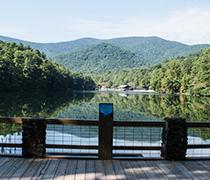
If you’ve been dreaming of visiting the French countryside, save yourself the flight and explore a picturesque Georgia mountain town that has all the charm but is much closer to home. Say “oui” to Braselton, located in North Georgia, less than an hour from three beautiful and diverse Georgia State Parks.
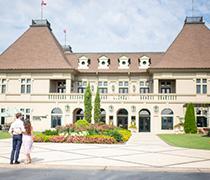
Uh-oh, it looks like your Internet Explorer is out of date. For a better shopping experience, please upgrade now.
Javascript is not enabled in your browser. Enabling JavaScript in your browser will allow you to experience all the features of our site. Learn how to enable JavaScript on your browser

Georgia Travel Guide 2020

- $19.90
- SHIP THIS ITEM Qualifies for Free Shipping Instant Purchase
Available within 2 business hours
- Want it Today? Check Store Availability
Related collections and offers
Product details, customer reviews.

Best Sellers in Savannah Georgia Travel Books
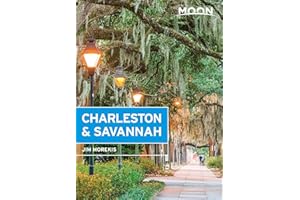
- ← Previous page
- Next page →

- Amazon Newsletter
- About Amazon
- Accessibility
- Sustainability
- Press Center
- Investor Relations
- Amazon Devices
- Amazon Science
- Sell on Amazon
- Sell apps on Amazon
- Supply to Amazon
- Protect & Build Your Brand
- Become an Affiliate
- Become a Delivery Driver
- Start a Package Delivery Business
- Advertise Your Products
- Self-Publish with Us
- Become an Amazon Hub Partner
- › See More Ways to Make Money
- Amazon Visa
- Amazon Store Card
- Amazon Secured Card
- Amazon Business Card
- Shop with Points
- Credit Card Marketplace
- Reload Your Balance
- Amazon Currency Converter
- Your Account
- Your Orders
- Shipping Rates & Policies
- Amazon Prime
- Returns & Replacements
- Manage Your Content and Devices
- Recalls and Product Safety Alerts
- Conditions of Use
- Privacy Notice
- Consumer Health Data Privacy Disclosure
- Your Ads Privacy Choices
Travel Guide Georgia
Book your individual trip , stress-free with local travel experts
Select Month
- roughguides.com
- Travel guide
Plan your tailor-made trip with a local expert
Book securely with money-back guarantee
Travel stress-free with local assistance and 24/7 support
Wedged between Russia , Turkey , Armenia and Azerbaijan, Georgia is little known among Western tourists. But it's long attracted visitors from neighbouring countries – and there's really no wonder.
The pretty capital, Tbilisi, is rich in history and architecture – including some controversial modern additions to the skyline – while its nightlife is wild enough to rival Berlin's. But it's what lies beyond the city that's Georgia's real draw card. There are nine national parks, as well as many more nature reserves and “protected landscapes”, so much of the country's epic scenery remains pretty much untouched.There's never been a better time to go, either; there are now more airline connections than ever and some great new places to stay.
From the looming peaks of the Caucasus to the dramatic forest-backed beaches of the Black Sea coast, the local experts we partner with in Georgia, would be delighted to create your own tailor-made trip.
Find even more inspiration here

Planning your own trip? Prepare for your trip
Use Rough Guides' trusted partners for great rates

written by Franzi Wirth
updated 26.04.2021
Ready to travel and discover Georgia?
Get support from our local experts for stress-free planning & worry-free travels.

IMAGES
VIDEO
COMMENTS
Free Georgia Travel Guide. Georgia's Official State Travel Guide is your complete resource to planning a vacation in Georgia. Find trip ideas, attractions, dining, events, activities, accommodations, map travel resources and much more. Read Features & Play Games.
From the cobblestone streets of historic Savannah, Georgia, to Atlanta's Sweet Auburn Historic District and the civil rights movement, Georgia offers something for everyone. Plan your next trip with the help of AAA's digital TourBook travel guide, available for mobile, tablet or desktop. With this trip guide, you'll receive advice from ...
Let's Visit Savannah Georgia: Fun Facts and Amazing Discoveries for Kids (Hey Kids! Let's Visit Travel Books #6) Teresa Mills. ... Savannah Georgia Travel Guide 2023-2024: A Comprehensive Travel Guide for Exploring Savannah's History, Cuisine, and Hidden Delights. Shirley Jones.
Discover the best books in Amazon Best Sellers. Find the top 100 most popular Amazon books. ... SAVANNAH GEORGIA TRAVEL GUIDE 2024: Your Definitive Guide to Experiencing the Enchantment, Culture, and Hidden Delights of Georgia's Jewel. Mario Clark. Paperback. 1 offer from $15.00 #37.
Solo Travel. Copy My Trip: Georgia's wine country, cathedrals and cultural highlights. Apr 23, 2024 • 5 min read ... Book popular activities in Georgia. Guidebooks Purchase our award-winning guidebooks. Get to the heart of Georgia with one of our in-depth, award-winning guidebooks, covering maps, itineraries, and expert guidance. ...
About this book. This new seventh edition of Bradt's Georgia remains the only dedicated guide to this fascinating, budget-friendly Caucasian country, where tourism continues to increase and domestic travel is increasingly straightforward. Thoroughly updated throughout to reflect recent developments, this guidebook includes revised and new ...
Through her book "Georgia Travel Guide: A Country of Hospitality, Wine, and Mountains", Natalie aims to bring attention to lesser-known destinations that often go unnoticed, yet hold a wealth of experiences for adventure-seeking travelers. Customer reviews. 5 out of 5 stars. 5 out of 5. 3 global ratings. 5 star: 100%: 4 star ...
Online shopping for Georgia Travel Guides in the Books Store. ... SAVANNAH GEORGIA TRAVEL GUIDE 2024: Your Definitive Guide to Experiencing the Enchantment, Culture, and Hidden Delights of Georgia's Jewel (UPDATED ULTIMATE TRAVEL GUIDE Book 6) Quick look. $18.95 $ 18. ...
Accommodation - Georgia is a great budget backpacker destination, with a ton of cheap accommodation options. A bed in a 4-6-bed dorm costs around 15-20 GEL per night. For a private room in a hostel, expect to pay around 50-80 GEL per night. Free Wi-Fi is standard and most hostels also have self-catering facilities.
Embark on an unforgettable journey through the enchanting landscapes and vibrant culture of Georgia with the ultimate companion - the Georgia Travel Guide 2024. Whether you're a seasoned traveler seeking new horizons or a curious explorer venturing into uncharted territories, this comprehensive guide is your passport to unlocking the hidden ...
📢 In my Travel Resources Page you can find the list of all the sites and services I use to book hotels, tours, travel insurance and more. Don't forget to check our travel guide to Georgia. As well as all our Georgia articles: Travel Guide to Kakheti; Tbilisi Travel Guide; Georgia Itinerary; Travel Guide to Kazbegi; Trekking Guide to Georgia
The 20 best georgia travel guide books, such as Georgia, Moon Georgia, GEORGIA & ARMENIA, Wildsam Field Guides and Georgia Travel Guide. Categories Experts Newsletter. BookAuthority; BookAuthority is the world's leading site for book recommendations, helping you discover the most recommended books on any subject. ...
To the east, you'll find Coastal Georgia, a region known for its gorgeous beaches and islands. The waterfront city of Savannah is a favorite of many travelers for its old-world charm, vibrant arts scene, and many delicious restaurants. Jekyll Island and St. Simons Island, once retreats for America's elite, now offer anyone the chance to ...
Embark on an unforgettable adventure through the heart of the Caucasus with the 'Georgia Travel Guide 2024'! Discover the hidden treasures of Tbilisi's ancient streets with our comprehensive Tbilisi city guide, hike through the majestic peaks of the Caucasus Mountains, and unwind on the sun-drenched shores of the Black Sea coast.
Everything you need to know to visit Georgia in 2024, including up-to-date city and regional guides, insider tips, and a wealth of resources collected from my Georgia travel blog. Last updated: May 2024. If Georgia (the country) features on your travel wish list, then I have good news for you: There has never been a better time to visit Georgia!
The Georgia State Parks & Historic Sites Park Guide is a handy resource for planning a spring break, summer vacation or family reunion. The free booklet is filled with tips on the best hiking trails, fishing spots, cabins, wedding venues and campsites. Request a free copy by mail or pick one up in any park office. View Park Guide Online
Your complete guide to what to do, where to stay and where to eat in Savannah, GA. Plan a charming, Southern escape, where quirkiness materializes through art and period architecture houses trendy boutiques, where ghost stories are set under a veil of Spanish moss and where local cuisine comes straight from the coast.
The guide book contains up to the date information about local cuisine, transportation, interesting places to visit, accommodation options, security and the history of Georgia. Written by a native who has tons of useful knowledge, Georgia Travel Guide 2020 is a handy and useful passport to the best in Georgia!
51 offers from $10.86. #3. Fodor's InFocus Savannah: with Hilton Head and the Lowcountry (Full-color Travel Guide) Fodor's Travel Guides. 154. Paperback. 60 offers from $2.22. #4. Self-Guided Tour of Savannah-Brush up on Savannah's History with Easy-to-Follow Maps and Accompanying Guide.
This site is owned by Apa Digital AG, Bahnhofplatz 6, 8854 Siebnen, Switzerland. Rough Guides® is a trademark owned by Apa Group with its headquarters at 7 Bell Yard London WC2A 2JR, United Kingdom. Wedged between Russia, Turkey, Armenia and Azerbaijan, Georgia is little known among Western tourists. But it's long attracted visitors from ...